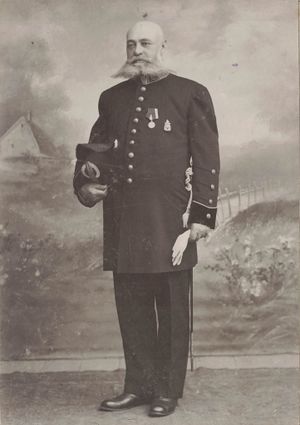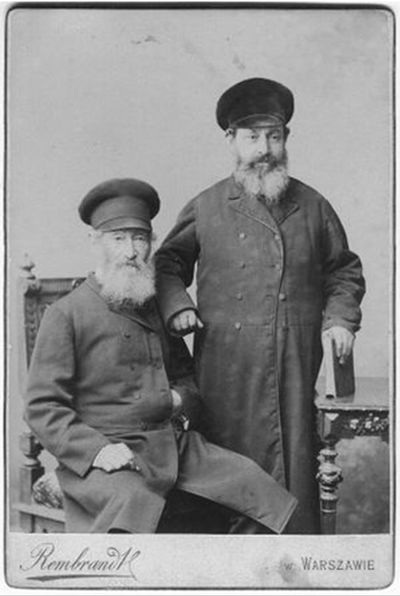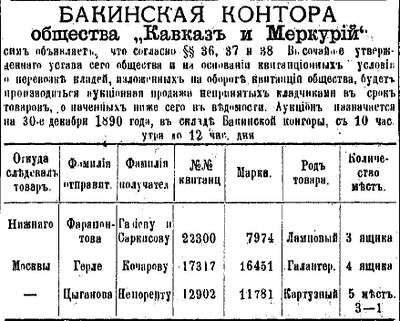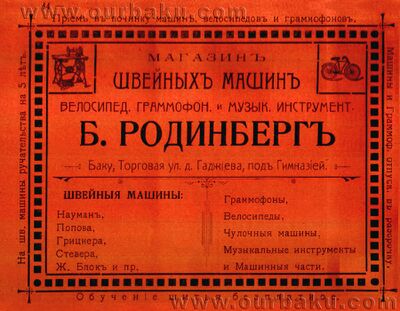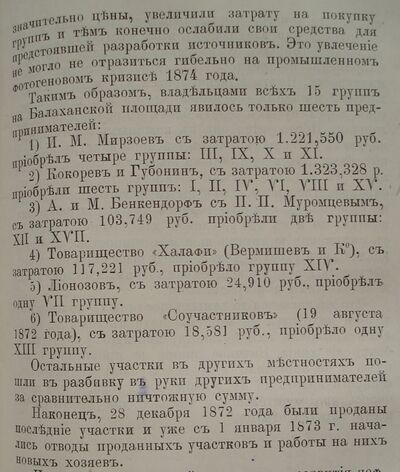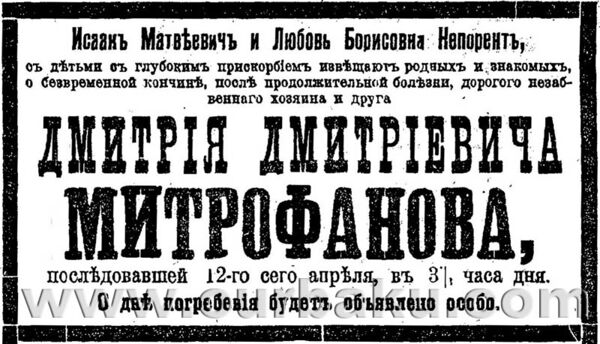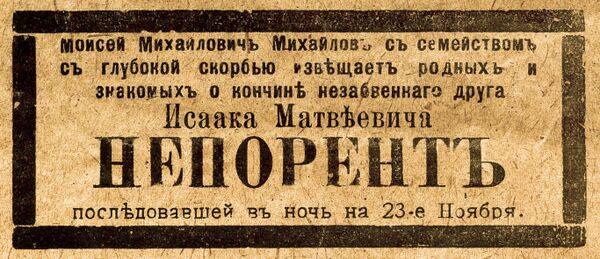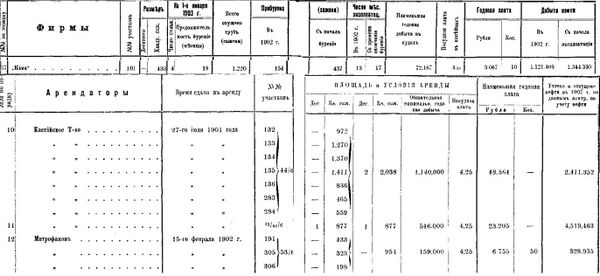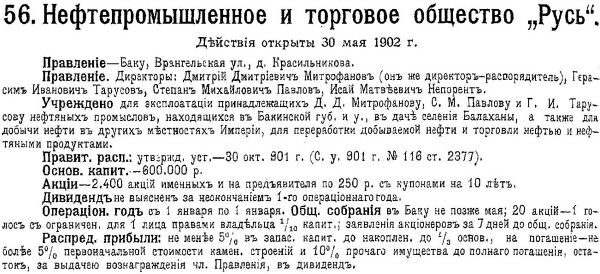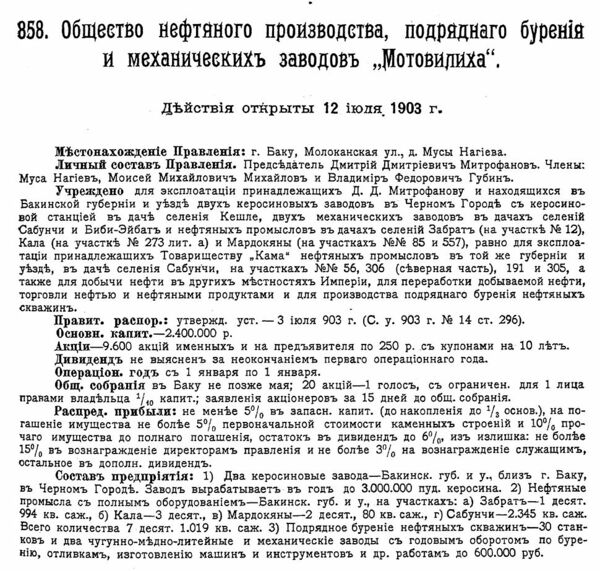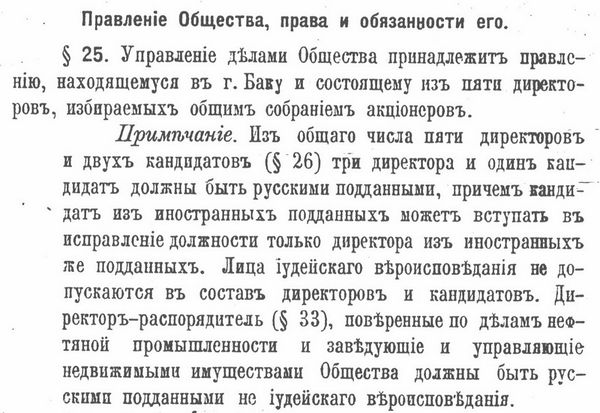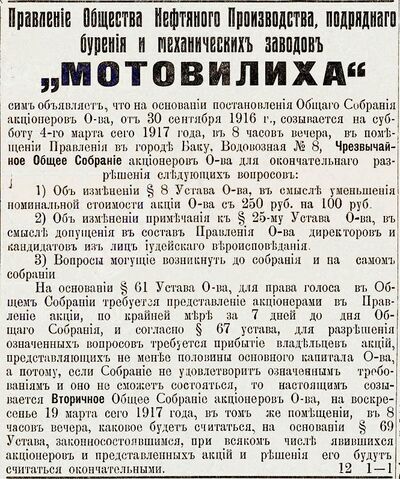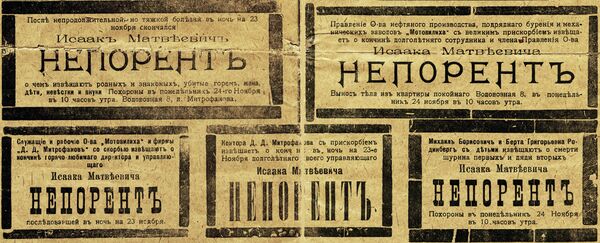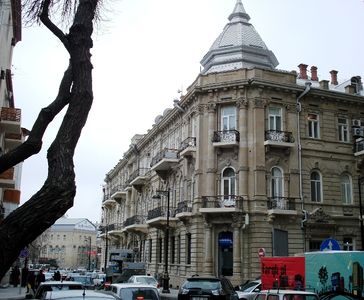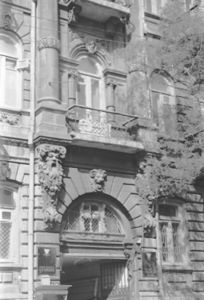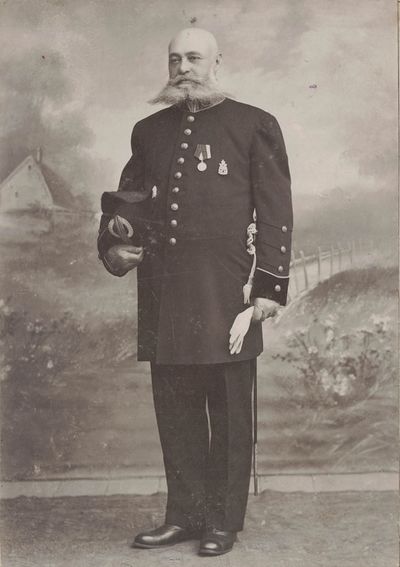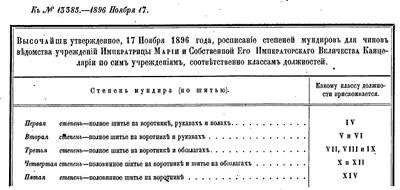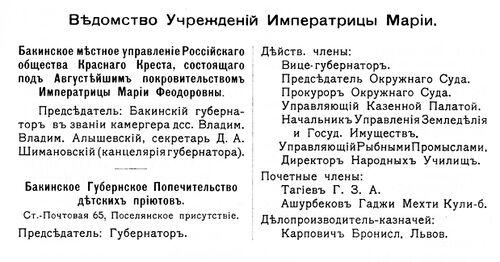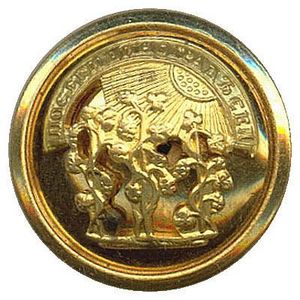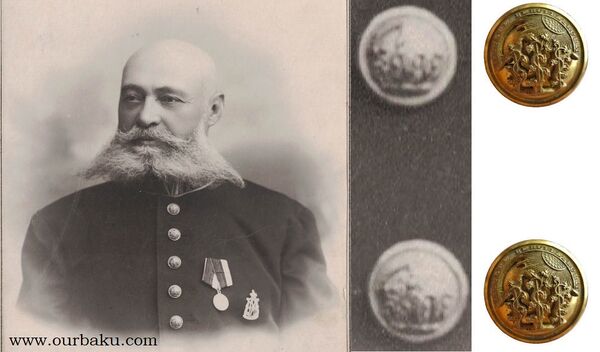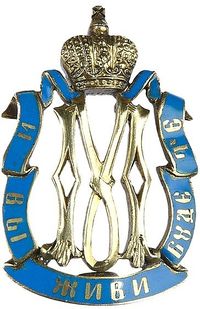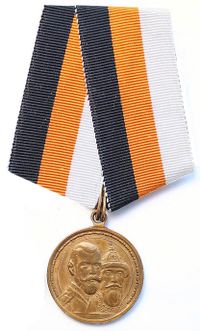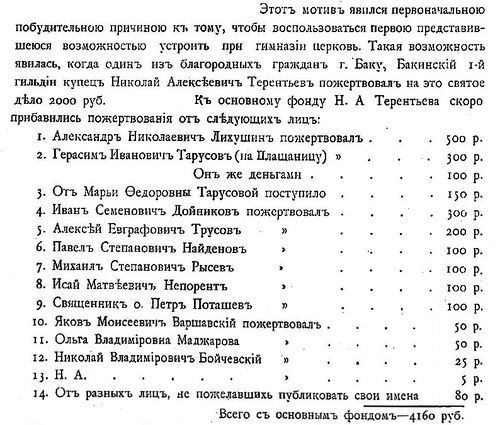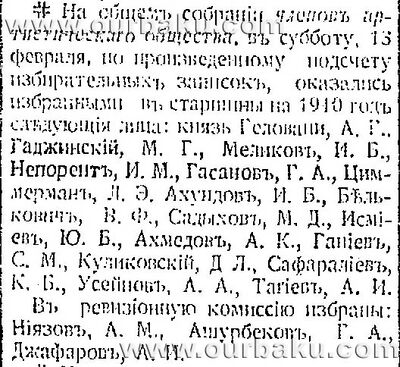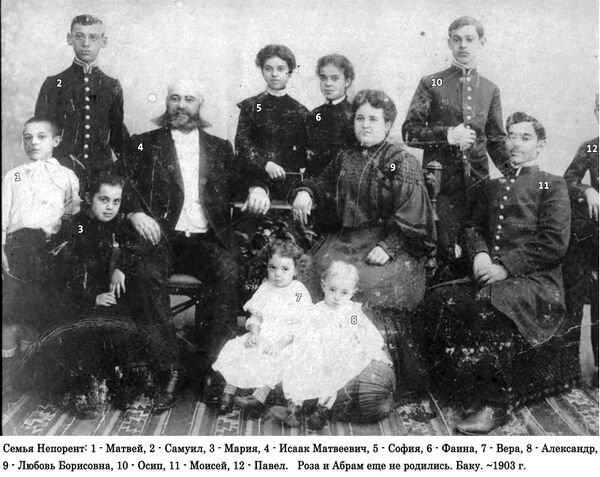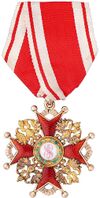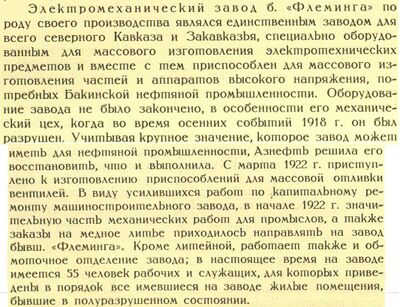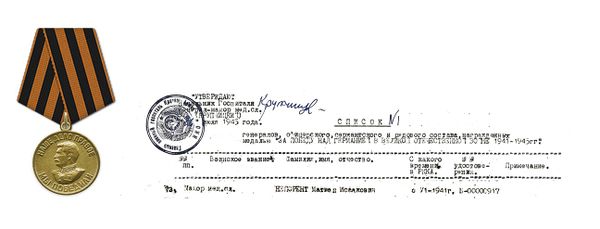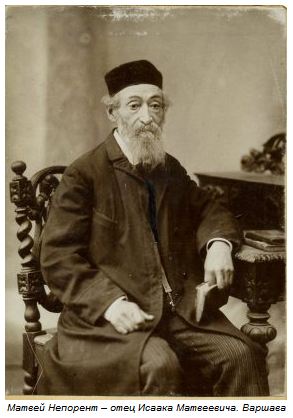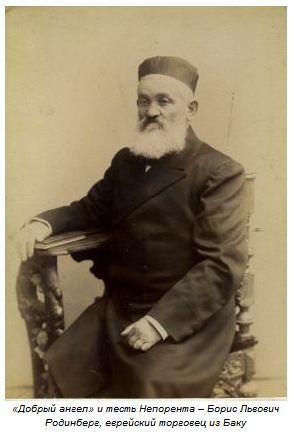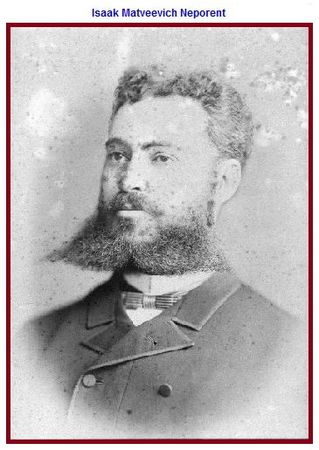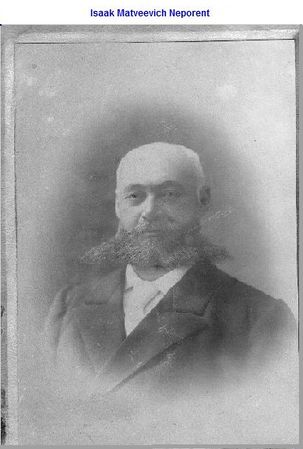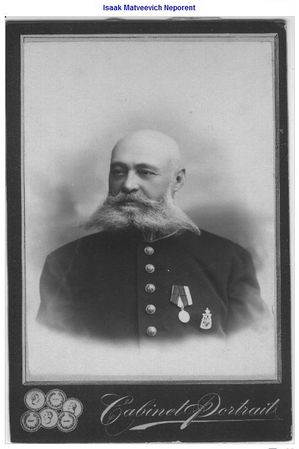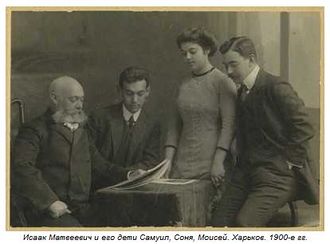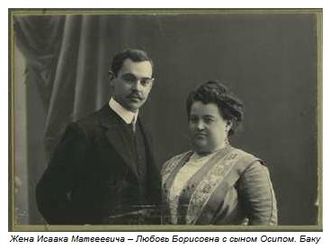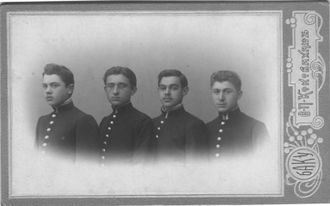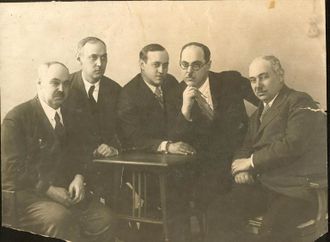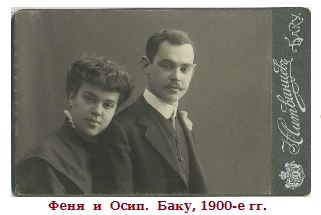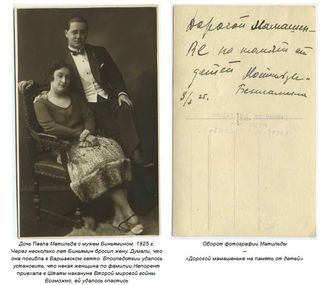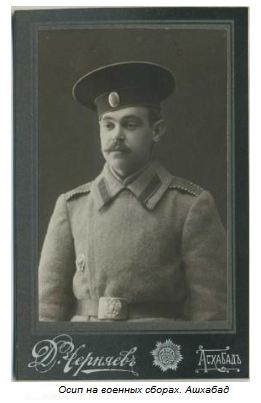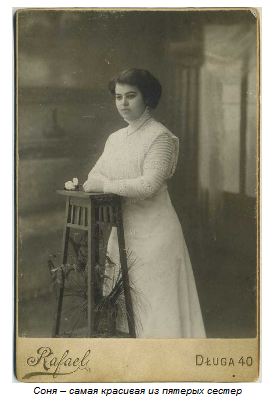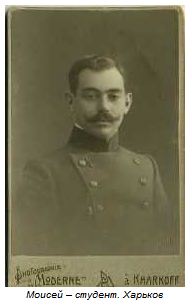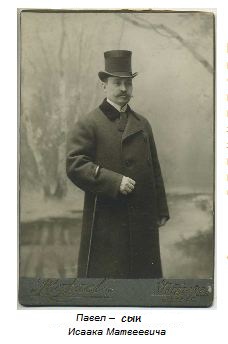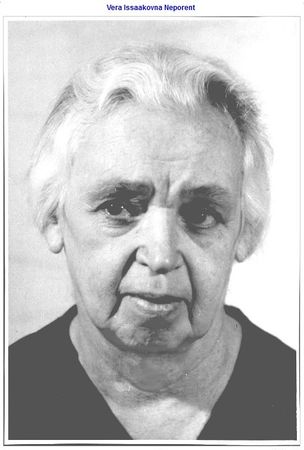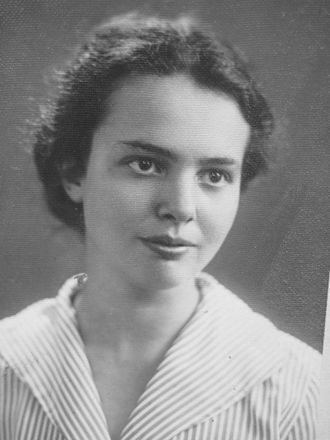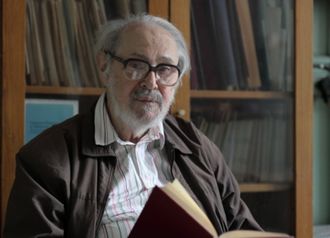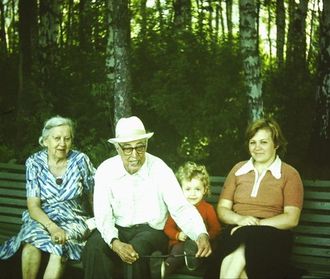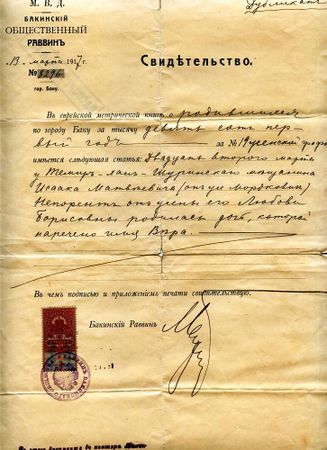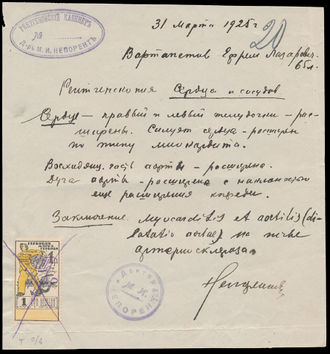Neporent Isaac Matveevich. The Mystery of the Family: различия между версиями
I am (обсуждение | вклад) |
Jonka (обсуждение | вклад) |
||
| (не показано 26 промежуточных версий 1 участника) | |||
| Строка 1: | Строка 1: | ||
==[[Neporent Isaac Matveevich. The Mystery of the Family|Непорент Исаак Матвеевич. Тайна семьи]]== | ==[[Neporent Isaac Matveevich. The Mystery of the Family|Непорент Исаак Матвеевич. Тайна семьи]]== | ||
"To the descendants scattered around the world and who do not know the Russian language" | "To the descendants scattered around the world and who do not know the Russian language" | ||
| − | |||
| − | |||
==="Secrets" of the Baku tree of the Neporent (Nieporent) family=== | ==="Secrets" of the Baku tree of the Neporent (Nieporent) family=== | ||
| Строка 76: | Строка 74: | ||
Note. Those who are assigned to the city are considered to have a solid settlement, who will build buildings or cultivate gardens and orchards that bring them income, or by legal acquisition from other persons who previously settled, become owners of real property." <br> | Note. Those who are assigned to the city are considered to have a solid settlement, who will build buildings or cultivate gardens and orchards that bring them income, or by legal acquisition from other persons who previously settled, become owners of real property." <br> | ||
The provision of benefits in the "Position" was made in order to attract migrants to Temir Khan Shura and thus increase the settled population of This city.<br> | The provision of benefits in the "Position" was made in order to attract migrants to Temir Khan Shura and thus increase the settled population of This city.<br> | ||
| − | Allowing Jews to be assigned to the Temir Khan-shurinsky city society was a privilege for them, as an exception to the General rule to live only in certain provinces – in the Pale of Settlement.<ref>In the Charter about passports mentioned province, in which Jews were permitted permanent settlement – Pale of Settlement.</ref> | + | Allowing Jews to be assigned to the Temir Khan-shurinsky city society was a privilege for them, as an exception to the General rule to live only in certain provinces – in the Pale of Settlement.<ref>In the Charter about passports mentioned province, in which Jews were permitted permanent settlement – Pale of Settlement.[https://en.wikipedia.org/wiki/Pale_of_Settlement]</ref> |
Therefore, Isaac Neporent purchased a house in Temir Khan-Shur, for which he later paid taxes, both to the Treasury and to the city budget. The house was used as a summer cottage. | Therefore, Isaac Neporent purchased a house in Temir Khan-Shur, for which he later paid taxes, both to the Treasury and to the city budget. The house was used as a summer cottage. | ||
| Строка 461: | Строка 459: | ||
| − | Warning readers' questions: the list also mentions David Landau, the father of the Nobel prize winner Lev | + | Warning readers' questions: the list also mentions David Landau, the father of the Nobel prize winner Lev Landau[https://en.wikipedia.org/wiki/Lev_Landau] of Baku. For his charitable donations to the institutions of the office of the Empress Mary, Isaac Neporent was awarded the right to wear the uniform of this office. This served to increase its status in business and official Baku. To have and wear a uniform at that time was prestigious and honorable. |
| − | For his charitable donations to the institutions of the office of the Empress Mary, Isaac Neporent was awarded the right to wear the uniform of this office. This served to increase its status in business and official Baku. To have and wear a uniform at that time was prestigious and honorable. | ||
In addition to charity, Isaac Neporent participated in the public life of the city. He was a member of the Artists ' society, and in 1910 was elected to the senior ranks of this society. Actively participating in its activities, he was elected as a senior member of the society in the following years.<br> | In addition to charity, Isaac Neporent participated in the public life of the city. He was a member of the Artists ' society, and in 1910 was elected to the senior ranks of this society. Actively participating in its activities, he was elected as a senior member of the society in the following years.<br> | ||
| Строка 481: | Строка 478: | ||
Note: Correspondence of scientific degrees: the Russian “candidate of science” corresponds to the philosophy doctor, and "Doctor of science" corresponds to the "grand philosophy doctor". The Russian "professor" corresponds to the English "full professor". The article specifies Russian titles.<br> | Note: Correspondence of scientific degrees: the Russian “candidate of science” corresponds to the philosophy doctor, and "Doctor of science" corresponds to the "grand philosophy doctor". The Russian "professor" corresponds to the English "full professor". The article specifies Russian titles.<br> | ||
He graduated from the Baku Emperor Alexander III men's gymnasium in 1904.<br> | He graduated from the Baku Emperor Alexander III men's gymnasium in 1904.<br> | ||
| − | He received his higher education in Germany, during the work of Wilhelm Conrad Roentgen. On the website of the oldest Russian state University named after N. I. Pirogov in St. Petersburg, there is an entry:<br> | + | He received his higher education in Germany, during the work of Wilhelm Conrad Roentgen. On the website of the oldest Russian state University[https://rnrmu.com/] named after N. I. Pirogov in St. Petersburg, there is an entry:<br> |
Among the first employees of the Department of radiology were later to become the largest specialists in the field of radiology and radiology ... Mi Neporent...<br> | Among the first employees of the Department of radiology were later to become the largest specialists in the field of radiology and radiology ... Mi Neporent...<br> | ||
Moses Neporent graduated from the course of medical Sciences in 1910 with the title of "doctor"<ref>The title "doctor" was awarded to graduates of higher medical educational institutions (medical academies and medical faculties of universities) until 1918. The title of doctor was indicated in the diplomas of graduates who successfully passed the final exam. After the great October socialist revolution, in 1918, the term "doctor" was replaced with "doctor” in official documents and diplomas of higher medical schools.</ref>, after which he worked as a rural doctor in villages “Zuid-Spanning Kultuk” Javadaga district of the Baku province.<br> | Moses Neporent graduated from the course of medical Sciences in 1910 with the title of "doctor"<ref>The title "doctor" was awarded to graduates of higher medical educational institutions (medical academies and medical faculties of universities) until 1918. The title of doctor was indicated in the diplomas of graduates who successfully passed the final exam. After the great October socialist revolution, in 1918, the term "doctor" was replaced with "doctor” in official documents and diplomas of higher medical schools.</ref>, after which he worked as a rural doctor in villages “Zuid-Spanning Kultuk” Javadaga district of the Baku province.<br> | ||
| Строка 517: | Строка 514: | ||
They had two daughters: twins Deborah (aka Vera) (1923, Baku) and Leah (aka Elena) (1923, Baku – 1967, Leningrad). At the request of their parents and the subsequent order of 30.12. 1935, their names were changed: Deborah (Vera) to Tatiana, Leah (Elena) to Olga. | They had two daughters: twins Deborah (aka Vera) (1923, Baku) and Leah (aka Elena) (1923, Baku – 1967, Leningrad). At the request of their parents and the subsequent order of 30.12. 1935, their names were changed: Deborah (Vera) to Tatiana, Leah (Elena) to Olga. | ||
'''Tatyana Moiseevna Svistunova''' (nee Neporent) - oncologist, Doctor of Medical Sciences., author of a monograph on radiotherapy of skin cancer in children. The result of her own practice was more than 5 thousand completely cured children.<br> | '''Tatyana Moiseevna Svistunova''' (nee Neporent) - oncologist, Doctor of Medical Sciences., author of a monograph on radiotherapy of skin cancer in children. The result of her own practice was more than 5 thousand completely cured children.<br> | ||
| − | Her husband, Valentin Svistunov (1923-1999), was a ship commander and naval engineer. He worked on the creation of strategic missile systems for submarines and their transfer to peaceful use. For this work, he was awarded the USSR State prize and the order of Lenin. | + | Her husband, Valentin Svistunov (1923-1999), was a ship commander and naval engineer. He worked on the creation of strategic missile systems for submarines and their transfer to peaceful use. For this work, he was awarded the USSR State prize and the order of Lenin[https://en.wikipedia.org/wiki/USSR_State_Prize]. |
| + | |||
'''Their son - Dmitry Valentinovich Svistunov'''. Born in Leningrad in 1955. Occupation: scientist physicist-optician. Information about him and his parents is published in the American collection "Who's who" - Marquis "Who's Who" <ref>Marquis is an American publisher of several catalogues containing short biographies. (2001)</ref> | '''Their son - Dmitry Valentinovich Svistunov'''. Born in Leningrad in 1955. Occupation: scientist physicist-optician. Information about him and his parents is published in the American collection "Who's who" - Marquis "Who's Who" <ref>Marquis is an American publisher of several catalogues containing short biographies. (2001)</ref> | ||
| Строка 525: | Строка 523: | ||
'''''1886, Baku – 1966, Leningrad''''' | '''''1886, Baku – 1966, Leningrad''''' | ||
| − | Doctor of Economics, Professor of the Leningrad Polytechnic Institute. Now St._Petersburg_Polytechnic_University.<br> | + | Doctor of Economics, Professor of the Leningrad Polytechnic Institute. Now St._Petersburg_Polytechnic_University.[https://en.wikipedia.org/wiki/Peter_the_Great_St._Petersburg_Polytechnic_University]<br> |
| − | Osip (Joseph) Isaakovich graduated from the oldest in Eastern Europe | + | Osip (Joseph) Isaakovich graduated from the oldest in Eastern Europe [https://en.wikipedia.org/wiki/National_University_of_Kharkiv] Kharkiv National Universityand Higher technical school in Darmstadt with a degree in engineering and Economics.<br> |
In order not to serve as a military recruit, Osip decided to enroll as a volunteer<ref>A Volunteer is a military officer (from the lower ranks) of the Russian Imperial army and Navy who entered military service voluntarily and enjoyed certain benefits. You can read more about the free-finders in Wikipedia in the article " free-Finders"</ref>. That is, at your own expense, without receiving the proper maintenance, going to the unit as a job.<br> | In order not to serve as a military recruit, Osip decided to enroll as a volunteer<ref>A Volunteer is a military officer (from the lower ranks) of the Russian Imperial army and Navy who entered military service voluntarily and enjoyed certain benefits. You can read more about the free-finders in Wikipedia in the article " free-Finders"</ref>. That is, at your own expense, without receiving the proper maintenance, going to the unit as a job.<br> | ||
"Jews could enroll in the voluntary service on a General basis, but they were not made officers. This rule was tacit, and the law did not explicitly prohibit Jews from receiving officer rank until 1913."<br> | "Jews could enroll in the voluntary service on a General basis, but they were not made officers. This rule was tacit, and the law did not explicitly prohibit Jews from receiving officer rank until 1913."<br> | ||
| Строка 532: | Строка 530: | ||
Later, he worked at industrial enterprises in Baku.<br> | Later, he worked at industrial enterprises in Baku.<br> | ||
In 1923, he was the head of the electrical and Mechanical plant, related to the management of subsidiary enterprises of “Aznefti”. Electromechanical plant, a former factory Fleming, located at the address: Shamakhika street<ref>Shamakhika – now "St. Jafar Jabbarli"</ref>, D. 67/69. | In 1923, he was the head of the electrical and Mechanical plant, related to the management of subsidiary enterprises of “Aznefti”. Electromechanical plant, a former factory Fleming, located at the address: Shamakhika street<ref>Shamakhika – now "St. Jafar Jabbarli"</ref>, D. 67/69. | ||
| + | [[Файл:Zavod Fleming.jpg|400px|center]] | ||
In 1924, engineer Neporent O. I. worked as an assistant to the head of the production Department of the technical Staff of Aznefti. Lived at the address: corner "Vodovoznay” and Agamali-oglu. Was in the engineering section of the Union miners in the district (place of residence). | In 1924, engineer Neporent O. I. worked as an assistant to the head of the production Department of the technical Staff of Aznefti. Lived at the address: corner "Vodovoznay” and Agamali-oglu. Was in the engineering section of the Union miners in the district (place of residence). | ||
| Строка 539: | Строка 538: | ||
In 1933, Osip Isaakovich published a monograph "Scientific bases of calendar movement of production, calculation of the duration of production cycles".<br> | In 1933, Osip Isaakovich published a monograph "Scientific bases of calendar movement of production, calculation of the duration of production cycles".<br> | ||
| − | With the beginning of the Leningrad | + | With the beginning of the Leningrad blockade[https://en.wikipedia.org/wiki/Siege_of_Leningrad] was evacuated from the Institute.<br> |
In 1943-47. Osip Isaakovich was the Dean of the faculty of engineering and Economics of the Leningrad Polytechnic Institute. Author of more than 60 scientific publications.<br> | In 1943-47. Osip Isaakovich was the Dean of the faculty of engineering and Economics of the Leningrad Polytechnic Institute. Author of more than 60 scientific publications.<br> | ||
He had no family. After the end of the war, he took financial care of relatives who remained in Baku. | He had no family. After the end of the war, he took financial care of relatives who remained in Baku. | ||
| Строка 560: | Строка 559: | ||
“Soon after graduating from the University, [Samuel Neporent] was drafted into the tsarist army. After the war, he worked as an accountant.<br> | “Soon after graduating from the University, [Samuel Neporent] was drafted into the tsarist army. After the war, he worked as an accountant.<br> | ||
In 1931, my father worked as a chief accountant in the workshops of Kaspar and there as an inspector of the “Sudostroy Association”. In the shops of the plant, the NKVD had discovered the embezzlement. Among others, the father was also arrested.<br> | In 1931, my father worked as a chief accountant in the workshops of Kaspar and there as an inspector of the “Sudostroy Association”. In the shops of the plant, the NKVD had discovered the embezzlement. Among others, the father was also arrested.<br> | ||
| − | For lack of political content, the case was referred to the people's Commissariat of Justice. The court in 1934 sentenced the father to 10 years of imprisonment under the law ?? However, the USSR Prosecutor Vishinski dismissed the unsubstantiated charges against his father… Released in August 1934."<br> | + | For lack of political content, the case was referred to the people's Commissariat of Justice. The court in 1934 sentenced the father to 10 years of imprisonment under the law ?? However, the USSR Prosecutor Vishinski[https://en.wikipedia.org/wiki/Andrey_Vyshinsky] dismissed the unsubstantiated charges against his father… Released in August 1934."<br> |
The autobiography did not indicate that Samuel studied at the same Kharkiv National Universityas his older brother Osip, because due to the birth of his son and departure, he received a certificate of completion of the course instead of a diploma of Lawyer .<br> | The autobiography did not indicate that Samuel studied at the same Kharkiv National Universityas his older brother Osip, because due to the birth of his son and departure, he received a certificate of completion of the course instead of a diploma of Lawyer .<br> | ||
Wife Mary M. (maiden name Derkowska, 1892 - 1962, Leningrad).<br> | Wife Mary M. (maiden name Derkowska, 1892 - 1962, Leningrad).<br> | ||
| Строка 575: | Строка 574: | ||
His mother, Yulia Sokolskaya, is an obstetrician and gynecologist, and his father, Timofey Sokolsky, is a certified lawyer. | His mother, Yulia Sokolskaya, is an obstetrician and gynecologist, and his father, Timofey Sokolsky, is a certified lawyer. | ||
Perhaps in 1937, he was already a student at the Leningrad Polytechnic Institute. After the execution of his father, he was sent into exile in Ivanovo. There he studied at the Textile Institute.<br> | Perhaps in 1937, he was already a student at the Leningrad Polytechnic Institute. After the execution of his father, he was sent into exile in Ivanovo. There he studied at the Textile Institute.<br> | ||
| − | In 1939, he returned from exile in Leningrad. To learn he transferred to Leningrad Polytechnic Institute named after Kalinin. At the beginning of the war, he volunteered for the army. On the "Road of life" through Ladoga, he was transported to the rear in Chelyabinsk, where he trained tank drivers in a military school. | + | In 1939, he returned from exile in Leningrad. To learn he transferred to Leningrad Polytechnic Institute named after Kalinin. At the beginning of the war, he volunteered for the army. On the "Road of life"[https://en.wikipedia.org/wiki/Road_of_Life] through Ladoga, he was transported to the rear in Chelyabinsk, where he trained tank drivers in a military school. |
In 1943, as part of the" mobile " tank factory, he went to the front. With the tank army, he liberated Budapest, Berlin, and then Prague. From there, in 1945, he was sent to China for the war with Japan.<br> | In 1943, as part of the" mobile " tank factory, he went to the front. With the tank army, he liberated Budapest, Berlin, and then Prague. From there, in 1945, he was sent to China for the war with Japan.<br> | ||
| Строка 584: | Строка 583: | ||
'''''11 Aug. 1911 — 1997''''' | '''''11 Aug. 1911 — 1997''''' | ||
| − | After we managed to find a handwritten biography of Berthold in the questionnaire of the special Department of the State Optical Institute (GOI), his professional life finally became known to all of us. From questionnaires:<br> | + | After we managed to find a handwritten biography of Berthold in the questionnaire of the special Department of the State Optical Institute [https://en.wikipedia.org/wiki/Vavilov_State_Optical_Institute](GOI), his professional life finally became known to all of us. From questionnaires:<br> |
He graduated from the Baku industrial technical school in 1930. Since 1929, he worked as an electrical and radio technician.<br> | He graduated from the Baku industrial technical school in 1930. Since 1929, he worked as an electrical and radio technician.<br> | ||
From 1932 to 1937, he studied at the Leningrad Polytechnic Institute. After graduation, he was sent to the State Optical Institute, where he worked since 1936, holding several positions from laboratory assistant to head of the spectroscopy Department.<br> | From 1932 to 1937, he studied at the Leningrad Polytechnic Institute. After graduation, he was sent to the State Optical Institute, where he worked since 1936, holding several positions from laboratory assistant to head of the spectroscopy Department.<br> | ||
| Строка 594: | Строка 593: | ||
The final question from this questionnaire: "- what languages do you know, other than Russian, and to what extent do you speak them? | The final question from this questionnaire: "- what languages do you know, other than Russian, and to what extent do you speak them? | ||
- German-I read, Turkic <ref>In those years, the Azerbaijani language was called Turkic. And since Berthold spent all his childhood and youth in the courts of Baku, where all languages were mixed, as in Babylon, he kept it for the rest of his life.</ref> - I read and understand."<br> | - German-I read, Turkic <ref>In those years, the Azerbaijani language was called Turkic. And since Berthold spent all his childhood and youth in the courts of Baku, where all languages were mixed, as in Babylon, he kept it for the rest of his life.</ref> - I read and understand."<br> | ||
| − | In 1980, N. A. Borisevich, B. S. Neporent, V. V. Gruzinsky and V. A. Tolkachev were awarded the Lenin prize for the creation of a new scientific direction registered in the USSR as spectroscopy of free complex molecules.<ref>Wikipedia, article " Lenin prize"</ref><br> | + | In 1980, N. A. Borisevich, B. S. Neporent, V. V. Gruzinsky and V. A. Tolkachev were awarded the Lenin prize[https://en.wikipedia.org/wiki/Lenin_Prize] for the creation of a new scientific direction registered in the USSR as spectroscopy of free complex molecules.<ref>Wikipedia, article " Lenin prize"</ref><br> |
The Presidium of the USSR Academy of Sciences awarded him the S. I. Vavilov gold medal<ref>Wikipedia, article "gold medal of S. I. Vavilov"</ref> No. 13:<br> | The Presidium of the USSR Academy of Sciences awarded him the S. I. Vavilov gold medal<ref>Wikipedia, article "gold medal of S. I. Vavilov"</ref> No. 13:<br> | ||
Neporent Bertold Samuilovich, Ph. D., for research on solid luminescence and absorption spectra of complex organic molecules (1991). | Neporent Bertold Samuilovich, Ph. D., for research on solid luminescence and absorption spectra of complex organic molecules (1991). | ||
S. I. Vavilov is a world-famous scientist. The award in his name is given very rarely (only 19 laureates in the history of the Medal), for particularly outstanding discoveries of physicists in Russia.<br> | S. I. Vavilov is a world-famous scientist. The award in his name is given very rarely (only 19 laureates in the history of the Medal), for particularly outstanding discoveries of physicists in Russia.<br> | ||
| − | In the list of recipients, Berthold Neporent is between two Nobel laureates: I. Frank (#9) and V. Ginzburg (#14). Therefore, Russian scientists call this award their "Russian Nobel".<ref> 7% of the winners of the S. I. Vavilov gold medal were given by the land of Azerbaijan. That is, 9 people from Russia, 3 from Baku: Hasan Mammadbagir oglu Abdullayev, Yevgeny Feinberg, Bertold Samuilovich Neporent, the rest from France, Belgium, Poland, and Uzbekistan.</ref><br> | + | In the list of recipients, Berthold Neporent is between two Nobel laureates: I. Frank[https://en.wikipedia.org/wiki/Ilya_Frank] (#9) and V. Ginzburg[https://en.wikipedia.org/wiki/Vitaly_Ginzburg] (#14). Therefore, Russian scientists call this award their "Russian Nobel".<ref> 7% of the winners of the S. I. Vavilov gold medal were given by the land of Azerbaijan. That is, 9 people from Russia, 3 from Baku: Hasan Mammadbagir oglu Abdullayev, Yevgeny Feinberg, Bertold Samuilovich Neporent, the rest from France, Belgium, Poland, and Uzbekistan.</ref><br> |
To determine Berthold's place in Russian science is both difficult and not. He was "rolled" several times in the election to the Academy. At the Academy, as they joked about Jews at the time, " old nails were not torn out, but new ones were not hammered in." | To determine Berthold's place in Russian science is both difficult and not. He was "rolled" several times in the election to the Academy. At the Academy, as they joked about Jews at the time, " old nails were not torn out, but new ones were not hammered in." | ||
| − | Another thing is if you look at the magazine "Success of physical Sciences" - the most authoritative publication in Russia. It published his 8 scientific articles and 3 articles on personalities. In these personals, i.e. articles about awards or anniversaries, among the signatories in one row are P. L. Kapitsa, B. Kadomtsev, V. Ginzburg, Mandelstam and Berthold Neporent.<br> | + | Another thing is if you look at the magazine "Success of physical Sciences" - the most authoritative publication in Russia. It published his 8 scientific articles and 3 articles on personalities. In these personals, i.e. articles about awards or anniversaries, among the signatories in one row are P. L. Kapitsa,[https://en.wikipedia.org/wiki/Pyotr_Kapitsa] B. Kadomtsev, V. Ginzburg, Mandelstam and Berthold Neporent.<br> |
B. A. Chayanov left warm memories of Berthold in his book "Memories of Fiztech":<br> | B. A. Chayanov left warm memories of Berthold in his book "Memories of Fiztech":<br> | ||
( ... ) Doctor of science B. S. Neporent worked at the Optical Institute in Leningrad. Sometimes I came to Moscow for a scientific seminar at the FIAN, where I met students of Phystech and was honored and respected by them as a connoisseur of life and a good storyteller.<br> | ( ... ) Doctor of science B. S. Neporent worked at the Optical Institute in Leningrad. Sometimes I came to Moscow for a scientific seminar at the FIAN, where I met students of Phystech and was honored and respected by them as a connoisseur of life and a good storyteller.<br> | ||
| Строка 627: | Строка 626: | ||
'''''1892, Baku – 1958, Leningrad''''' | '''''1892, Baku – 1958, Leningrad''''' | ||
| − | Before the revolution, she sang in the “Mailovsky theater” (Azerbaijan state Opera and ballet theater) (Currently the Azerbaijan Opera and ballet theater named after M. F. Akhundov).<br> | + | Before the revolution, she sang in the “Mailovsky theater” [https://en.wikipedia.org/wiki/Azerbaijan_State_Academic_Opera_and_Ballet_Theater] (Azerbaijan state Opera and ballet theater) (Currently the Azerbaijan Opera and ballet theater named after M. F. Akhundov).<br> |
| − | After moving to St. Petersburg, she became an Opera singer at the State academic Opera and ballet theater, formerly the “Mariinsky Imperial Theater”.<br> | + | After moving to St. Petersburg, she became an Opera singer at the State academic Opera and ballet theater, formerly the “Mariinsky Imperial Theater” [https://en.wikipedia.org/wiki/Mariinsky_Theatre].<br> |
After the birth of her daughter Beatrice Ilinichna Vilenskaya, Faina Isaakovna became a music teacher of the great Russian singer Sofia Preobrazhenskaya, as well as other leading soloists of this theater.<br> | After the birth of her daughter Beatrice Ilinichna Vilenskaya, Faina Isaakovna became a music teacher of the great Russian singer Sofia Preobrazhenskaya, as well as other leading soloists of this theater.<br> | ||
| Строка 634: | Строка 633: | ||
Her Husband Is Ilya Davidovich Vilensky. Died on the way to evacuation during the great Patriotic war. Buried at the scene of death. | Her Husband Is Ilya Davidovich Vilensky. Died on the way to evacuation during the great Patriotic war. Buried at the scene of death. | ||
| − | Their daughter Beatrice I., Wilensky worked all | + | Their daughter Beatrice I., Wilensky worked all her life in the “National Library of Russia” [https://en.wikipedia.org/wiki/National_Library_of_Russia] named. Saltykova-Shchedrin on Nevsky Prospekt near “Gostiny Dvor”.<br> |
| − | The husband of Beatrice's daughter-Boris Sergeyevich Vilensky (1923- 2010). He came from a family of baptized Jews and was its namesake. Under tsarist rule, Jews were baptized for their survival.<br> | + | The husband of Beatrice's daughter - Boris Sergeyevich Vilensky (1923- 2010). He came from a family of baptized Jews and was its namesake. Under tsarist rule, Jews were baptized for their survival.<br> |
This is a copy of the Preface to his books, which continue to be published.<br> | This is a copy of the Preface to his books, which continue to be published.<br> | ||
| − | “Boris Vilensky is a major Russian neurologist, Doctor of Medical Sciences, Professor, and participant in the | + | “Boris Vilensky is a major Russian neurologist, Doctor of Medical Sciences, Professor, and participant in the World War II. He graduated from the First Saint Petersburg state medical University [https://en.wikipedia.org/wiki/First_Pavlov_State_Medical_University_of_St._Petersburg]named after academician I. p. Pavlov. After World War II worked in the district hospital in Leningrad, after in the Leningrad psychoneurological Institute named after V. M. Bekhterev.<br> |
He was the Deputy editor-in-chief of the Neurological journal. For more than half a century, the subject of study and scientific analysis for B. S. Vilensky discussed various aspects of the problem of vascular diseases of the brain-epidemiology and pathogenesis, clinic and intensive care, stroke outcomes and recognition errors, principles of organization of stage care and emergency conditions, rehabilitation, and prevention of cerebrovascular diseases. The author's long-term experience is reflected in numerous (more than 200) scientific publications and 18 well-known and popular monographs and manuals.” | He was the Deputy editor-in-chief of the Neurological journal. For more than half a century, the subject of study and scientific analysis for B. S. Vilensky discussed various aspects of the problem of vascular diseases of the brain-epidemiology and pathogenesis, clinic and intensive care, stroke outcomes and recognition errors, principles of organization of stage care and emergency conditions, rehabilitation, and prevention of cerebrovascular diseases. The author's long-term experience is reflected in numerous (more than 200) scientific publications and 18 well-known and popular monographs and manuals.” | ||
| Строка 658: | Строка 657: | ||
Doctor, scientist-Doctor of Medical Sciences, Professor, radiologist. He studied at the faculty of medicine at the Azerbaijan State University. As he said himself, he started his work here in Baku.<br> | Doctor, scientist-Doctor of Medical Sciences, Professor, radiologist. He studied at the faculty of medicine at the Azerbaijan State University. As he said himself, he started his work here in Baku.<br> | ||
| − | Then he worked at the Moscow 1st Medical University.<br> | + | Then he worked at the Moscow 1st Medical University[ps://en.wikipedia.org/wiki/First_Moscow_State_Medical_University].<br> |
| − | He was a radiologist for academician V. N. Vinogradov<ref>Wikipedia, article " Vinogradov, Vladimir Nikitich"</ref>, Stalin's personal doctor. After the arrest of academician Vinogradov in the "doctors' plot", he narrowly escaped arrest, but was dismissed from his job. He was able to return to his job only after the death of Stalin.<br> | + | He was a radiologist for academician V. N. Vinogradov<ref>Wikipedia, article " Vinogradov, Vladimir Nikitich"</ref>, Stalin's personal doctor. After the arrest of academician Vinogradov in the "doctors' plot" [https://en.wikipedia.org/wiki/Doctors%27_plot], he narrowly escaped arrest, but was dismissed from his job. He was able to return to his job only after the death of Stalin.<br> |
Here is how his student, a radiologist, Doctor of Medical Sciences, Professor Fyodor Mironovich Lyass writes about Matvey Isaakovich <ref>F. Lyass " the Last political process of Stalin"</ref><ref>His mother-a doctor at the Kremlin hospital E. F. Livshits, as well as many colleagues and friends of his father, were arrested and repressed in the "case of the Jewish anti-fascist Committee" and " The case of doctors-wreckers»</ref>:<br> | Here is how his student, a radiologist, Doctor of Medical Sciences, Professor Fyodor Mironovich Lyass writes about Matvey Isaakovich <ref>F. Lyass " the Last political process of Stalin"</ref><ref>His mother-a doctor at the Kremlin hospital E. F. Livshits, as well as many colleagues and friends of his father, were arrested and repressed in the "case of the Jewish anti-fascist Committee" and " The case of doctors-wreckers»</ref>:<br> | ||
Neporent (to my shame, I do not remember his name and patronymic) was the head of the radiological service at the Department of faculty therapy of the First medical Institute. Just at the Department headed by V. N. Vinogradov (one of the main accused in the case of "doctors-wreckers").<br> | Neporent (to my shame, I do not remember his name and patronymic) was the head of the radiological service at the Department of faculty therapy of the First medical Institute. Just at the Department headed by V. N. Vinogradov (one of the main accused in the case of "doctors-wreckers").<br> | ||
| Строка 670: | Строка 669: | ||
This is our wonderful radiologist Matvey Neporent, a brilliant specialist and a very bright, good person. He said that even in tsarist times, the whole village was "flogged" for something, but their family was not touched, and since then they have been assigned the surname "Neporent." <ref>Fragments from the book about V. G. Popov (1904 - 1994)</ref> in Russian, the words "flogged" and "neporent" sound consonant.<br> | This is our wonderful radiologist Matvey Neporent, a brilliant specialist and a very bright, good person. He said that even in tsarist times, the whole village was "flogged" for something, but their family was not touched, and since then they have been assigned the surname "Neporent." <ref>Fragments from the book about V. G. Popov (1904 - 1994)</ref> in Russian, the words "flogged" and "neporent" sound consonant.<br> | ||
| − | Matvey Isaakovich wife-Lidia Yakovlevna Bekle-Neporent is scientist, PhD in architecture. Worked in an architectural office. In her youth in Baku, she lived at the Nobel Villa Petrolea, whose Park was created by her father, who was invited by one of the Nobel brothers.<br> | + | Matvey Isaakovich wife - Lidia Yakovlevna Bekle-Neporent is scientist, PhD in architecture. Worked in an architectural office. In her youth in Baku, she lived at the Nobel Villa Petrolea [https://en.wikipedia.org/wiki/Villa_Petrolea], whose Park was created by her father, who was invited by one of the Nobel brothers.<br> |
The choice was not accidental: many gardens and parks in Warsaw were created under the leadership of E. Bekle. Experienced gardener E. Bekle, having studied the natural features of Absheron, paid special attention to the selection of trees to effectively emphasize the structure of the Villa.<br> | The choice was not accidental: many gardens and parks in Warsaw were created under the leadership of E. Bekle. Experienced gardener E. Bekle, having studied the natural features of Absheron, paid special attention to the selection of trees to effectively emphasize the structure of the Villa.<br> | ||
Children of the couple Matthew and Lydia Neporent was not. After the end of the World War II, Matvey and Lida took care of their relatives in Baku.<br> | Children of the couple Matthew and Lydia Neporent was not. After the end of the World War II, Matvey and Lida took care of their relatives in Baku.<br> | ||
David Neporent Recalls:<br> | David Neporent Recalls:<br> | ||
| − | Matvey and Vera, His sister, graduated from the medical faculty at the then young Azerbaijan state University, opened in 1920. | + | Matvey and Vera, His sister, graduated from the medical faculty at the then young Azerbaijan state University [https://en.wikipedia.org/wiki/Baku_State_University], opened in 1920. |
The peculiarity of this University was that they taught there as scientists who had fled from the Bolsheviks to Baku and remained there after the arrival of the 11th Red army. As well as specially invited professors, major specialists in their fields of medicine. The level of teaching of all subjects there was very high.<br> | The peculiarity of this University was that they taught there as scientists who had fled from the Bolsheviks to Baku and remained there after the arrival of the 11th Red army. As well as specially invited professors, major specialists in their fields of medicine. The level of teaching of all subjects there was very high.<br> | ||
Both Vera and Matvey said that after returning to Russia, these scientists (doctors) almost all joined the Academy of Sciences. Therefore, for a long time, the Baku medical Institute had a very good reputation.<br> | Both Vera and Matvey said that after returning to Russia, these scientists (doctors) almost all joined the Academy of Sciences. Therefore, for a long time, the Baku medical Institute had a very good reputation.<br> | ||
Matvey Isaakovich Neporent participated in the WorldWar II. With the beginning of the war in June 1941, he was drafted into the ranks of the Workers 'and peasants' Red Army (RKKA). He graduated from the war as a major in the medical service of the Main military hospital of the Red Army. Awarded the medal "For the victory over Germany in the great Patriotic war of 1941-1945. | Matvey Isaakovich Neporent participated in the WorldWar II. With the beginning of the war in June 1941, he was drafted into the ranks of the Workers 'and peasants' Red Army (RKKA). He graduated from the war as a major in the medical service of the Main military hospital of the Red Army. Awarded the medal "For the victory over Germany in the great Patriotic war of 1941-1945. | ||
| − | + | [[Файл:NeporentMatw.jpg|center|600px]] | |
<references/> | <references/> | ||
| Строка 688: | Строка 687: | ||
Doctor, scientist, candidate of medical Sciences.<br> | Doctor, scientist, candidate of medical Sciences.<br> | ||
| − | She worked at the 2nd Moscow Medical University.<br> | + | She worked at the 2nd Moscow Medical University [https://en.wikipedia.org/wiki/Russian_National_Research_Medical_University].<br> |
Her husband is Lev Rubin (1899 -1971, Moscow). Scientist, physiologist. Doctor of medicine.<br> | Her husband is Lev Rubin (1899 -1971, Moscow). Scientist, physiologist. Doctor of medicine.<br> | ||
Laid the Foundation for painless dental electrodiagnostic. Author of more than 130 scientific papers, including 2 textbooks and 4 monographs.<br> | Laid the Foundation for painless dental electrodiagnostic. Author of more than 130 scientific papers, including 2 textbooks and 4 monographs.<br> | ||
| Строка 694: | Строка 693: | ||
David Neporent recalls: "at the Institute where Lev Rubin worked, they knew that he always liked to take graduate students from Baku." | David Neporent recalls: "at the Institute where Lev Rubin worked, they knew that he always liked to take graduate students from Baku." | ||
| − | Their son is Pavel Lvovich (Zelik Lvovich) Rubin (1939-2018). He graduated from Moscow Institute of Physics and Technology in 1963. A theoretical physicist. After graduation, he started working at the Institute of physics of the USSR Academy of Sciences as a senior researcher, candidate of physical Sciences in 1974. Author of 66 publications on quantum physics. | + | Their son is Pavel Lvovich (Zelik Lvovich) Rubin (1939-2018). He graduated from Moscow Institute of Physics and Technology [https://en.wikipedia.org/wiki/Moscow_Institute_of_Physics_and_Technology] in 1963. A theoretical physicist. After graduation, he started working at the Institute of physics of the USSR Academy of Sciences as a senior researcher, candidate of physical Sciences in 1974. Author of 66 publications on quantum physics. |
===Alexander Isaakovich Neporent - 6th son and his branch=== | ===Alexander Isaakovich Neporent - 6th son and his branch=== | ||
'''''1902, Baku – 1952, Baku''''' | '''''1902, Baku – 1952, Baku''''' | ||
| − | Electrical engineer. Graduated from the Azerbaijan Industrial Institute( | + | Electrical engineer. Graduated from the Azerbaijan Industrial Institute (AzII)[https://en.wikipedia.org/wiki/Azerbaijan_State_Oil_and_Industry_University].<br> |
He worked as a chief engineer at various factories in the USSR. Participated in the great Patriotic war. He was wounded and demobilized. | He worked as a chief engineer at various factories in the USSR. Participated in the great Patriotic war. He was wounded and demobilized. | ||
At home, it was called Shura.<br> | At home, it was called Shura.<br> | ||
| Строка 713: | Строка 712: | ||
Children from the second wife - the of Batsavitskaya Lubov Davidovna:<br> | Children from the second wife - the of Batsavitskaya Lubov Davidovna:<br> | ||
*David Alexandrovich Neporent (1946, Baku) - the founder of the American branch.<br> | *David Alexandrovich Neporent (1946, Baku) - the founder of the American branch.<br> | ||
| − | He studied at the Baku school No. 26, then at the Baku Polytechnic College. He served in the army, then graduated from the Azerbaijan Polytechnic Institute. Specialist in the field of Cybernetics. He developed flow meters for various nuclear submarines (including the world's largest boat, the “Shark”, and the tragically famous “Kursk”. And also, dispensers for refueling various types of strategic missiles.Since the SKB "Neftekhimpribor", where he worked, was the base enterprise of the Azerbaijan Institute of petroleum and chemistry (ASIA). Therefore, he is the head of diploma projects of students at this Institute. | + | He studied at the Baku school No. 26, then at the Baku Polytechnic College. He served in the army, then graduated from the Azerbaijan Polytechnic Institute. Specialist in the field of Cybernetics. He developed flow meters for various nuclear submarines (including the world's largest boat, the “Shark”, and the tragically famous “Kursk”[https://en.wikipedia.org/wiki/Russian_submarine_Kursk_(K-141)]. And also, dispensers for refueling various types of strategic missiles [https://en.wikipedia.org/wiki/R-36_(missile)]. Since the SKB "Neftekhimpribor", where he worked, was the base enterprise of the Azerbaijan Institute of petroleum and chemistry (ASIA). Therefore, he is the head of diploma projects of students at this Institute. |
===Comments for non-Baku residents=== | ===Comments for non-Baku residents=== | ||
| Строка 753: | Строка 752: | ||
All generations of the Neporent family contributed to the struggle for the survival and preservation of the "Baku branch" and tried to benefit people in the countries in which they had to live.<br> | All generations of the Neporent family contributed to the struggle for the survival and preservation of the "Baku branch" and tried to benefit people in the countries in which they had to live.<br> | ||
All members of a huge family always helped and took an active part in each other's family Affairs.<br> | All members of a huge family always helped and took an active part in each other's family Affairs.<br> | ||
| − | From this publication, Neporents living in different countries will be able to learn the history of the Baku Branch of the Dynasty and feel their involvement: to organize the first industrial oil production in Russia in Baku together with D. Mitrofanov, Musa Nagiyev, Rothschild, and the BraNobel’s-a business that stood at the top of success.<br> | + | From this publication, Neporents living in different countries will be able to learn the history of the Baku Branch of the Dynasty and feel their involvement: to organize the first industrial oil production in Russia in Baku together with D. Mitrofanov, Musa Nagiyev [https://en.wikipedia.org/wiki/Musa_Naghiyev], Rothschild, and the BraNobel’s-a [https://en.wikipedia.org/wiki/Branobel]business that stood at the top of success.<br> |
They will learn that although Isaac and his children were deprived of money and wealth by the Soviet authorities, they could not take away the generosity of their soul and the wealth of their knowledge from his descendants.<br> | They will learn that although Isaac and his children were deprived of money and wealth by the Soviet authorities, they could not take away the generosity of their soul and the wealth of their knowledge from his descendants.<br> | ||
More than 600 scientific papers and dozens of monographs and textbooks were written at the common family table A new phenomenon in physics has been discovered, which has been evaluated by high scientific awards.<br> | More than 600 scientific papers and dozens of monographs and textbooks were written at the common family table A new phenomenon in physics has been discovered, which has been evaluated by high scientific awards.<br> | ||
And these achievements were widely shared in their extensive teaching, medical, and inventive work. | And these achievements were widely shared in their extensive teaching, medical, and inventive work. | ||
| + | |||
===Photo album=== | ===Photo album=== | ||
David Neporent recalls about the photos:<br> | David Neporent recalls about the photos:<br> | ||
| Строка 790: | Строка 790: | ||
''Authors of the article - D. Neporent, S. Koltunov''<br> | ''Authors of the article - D. Neporent, S. Koltunov''<br> | ||
| − | ''Technical editor I. | + | ''Technical editor I. Rothe'' |
| + | |||
| + | |||
| + | '''Статью "Непорент Исаак Матвеевич. Тайна семьи" на русском языке читайте''' [[Непорент Исаак Матвеевич. Тайна семьи|'''ЗДЕСЬ''']] | ||
| + | |||
| + | When using any materials from the site as a source of information is mandatory to specify the direct address of the article and the name of the author.<br> | ||
| + | COMMERCIAL use of any site materials in journalism and other purposes (reproduction in whole or in parts, processing and distribution, etc.) is possible ONLY with the written permission of the site administration. Requests should be sent to info(at)ourbaku.com<br> | ||
| + | <br> | ||
| + | <span style="color:#FF0000">'''Reference to "OUR BAKU" site (www.ourbaku.com) is mandatory when using materials from this article!'''</span> | ||
| + | |||
| + | |||
| + | |||
| + | |||
| + | |||
| − | [[Category | + | [[Category:Купцы]][[Category:Врачи]] [[Category:Предприниматели]][[Category: Все бакинцы]][[Category:Ученые]] |
Текущая версия на 16:17, 2 декабря 2021
Непорент Исаак Матвеевич. Тайна семьи[править]
"To the descendants scattered around the world and who do not know the Russian language"
"Secrets" of the Baku tree of the Neporent (Nieporent) family[править]
In the process of searching and research, the authors were presented not only a picture of the life of one – even if not an ordinary-Jewish family, but also a broad and unknown to the ordinary reader reality of those special relations with the laws of that time. Without knowledge of this reality, it would be difficult to understand much of the family history. We hope that the volume of the article itself will now be enough to answer the reader's many questions about Jewish and Baku life. without referring them to other sources.
- To find out that I could get an excellent education in
- elite universitiesin Russia not leaving the circle.
- of the family table was a definite shock for me!”
- David Neporent
- To find out that I could get an excellent education in
It was November 1919. It was sad these days at a huge family table on the third-floor gallery in the house number 8 on “Vodovoznaya” street, where a large family with children and household members usually gathered.
And not only because the head of a huge family, its founder and mainstay – Isaac Matveevich Neporent-had just been sent on his last journey, but also because the streets were restless, there was no confidence in the future and future well-being.
My beloved and native Baku was changing before my eyes. And although everyone had an education and, as they say," stood on their feet", it was necessary to seriously think about the future. And soon many Neporent left the city and settled in Moscow and Leningrad, which was possible in accordance with their education and work experience.
The founder of the Baku branch of the family was Isaac Matveevich Neporent.
Mercant of the 2nd Guild, oil industrialist-Director and Manager Of the company of oil production, contract drilling and mechanical plants "Motovilikha" and the firm "D. D. Mitrofanov", in the uniform of employees of the Department of institutions of the Empress Maria.
The Head of the family-Isaak Matveevich Neporent[править]
Why are we talking about the Baku branch? Yes, because the parents of Isaac-Mordechai Neporent and Gitla Rosenbaum-Rotstein - in the small town of Neporent[1] near Warsaw had 11 sons and one daughter. Mordechai later lived with his son Isaac in Baku.
Isaac Matveevich Neporent (1859, Neporent – 1919, Baku) was born in the Polish town of Neporent. When he came of age, he was engaged to Lyubov Borisovna Rodinberg (1867, Lenkoran? - 1940, Baku). She was the daughter of retired Merchant Nikolaev soldier Boris Rodinberg[2] and his wife Lyubov Danilovna Rodinberg (nee Yershova).
Lyubov Danilovna Yershova was from a family of "Gers" [3]. GERS (from "proselyte"; see ger). A small group of ethnic Russians who profess Judaism. exiled from Central Russia to the outskirts of the Empire, in Lenkoran. Her parents were farmers and engaged in agriculture. In life, she was called Esther Danilovna. Under this name she was buried.
Boris Rotenberg, being called up for military service, it took place in Lankaran, where he met his future wife. At that time, the Caucasian line No. 21 battalion was stationed in Lenkoran.
In 1868, this battalion was transferred to Baku and renamed the 66th Baku provincial battalion (the future Salyan regiment). By the time Boris Rotenberg was already married (the daughter of Love was born in 1867). And so, the wife, a soldier with a daughter, moved to her husband's new duty station in Baku.
In the old Salyan barracks, left over from the tsarist times, where, after their construction in 1909, the Salyan regiment was stationed. There, less than a century later, Boris's great – grandson, David Neporent, also served as a conscript!
Boris Rotenberg was the so-called "Nicholas soldiers", that is, he was drafted into military service by Conscription Statute enacted during the reign of Nicholas I.
In 1867, Emperor Alexander II highly approved the "Regulations on the arrangement of retired and indefinite leave of the lower ranks", which serves to facilitate the entry into civil life of dismissed from military service. And to obtain the benefits to which they have acquired the right to serve a fixed term.
Clause 5 of the Regulation stated:
Based on this provision, Boris Rodinberg, having served the established term (the term of service before retirement was at that time 20 years, while after 15 years of irreproachable service in the military, the lower ranks were dismissed on indefinite leave), settled in Baku. For this purpose, he was assigned to the Baku city society.
"He Got a job in a tailor shop. One day a General came to Boris Lvovich and ordered a uniform.
My great-grandfather refused. He is not a tailor, but a seamstress. And this is a General's uniform. It is no joke. But the General ordered it. where to go and I sewed. The General, when he saw the uniform, slapped his great-grandfather, and said: "And you say you can't make uniforms." Such is the General's gratitude.
Then my great-grandfather went into business. He called himself "kipets" (merchant) – well, very "literate" was".[4] It is not known where Rodinberg met and met Isaac Neporent and what attracted him to the young Isaac, but he suggested that the young man go with him to Baku.
In those years, a Neporent who lived in the Kingdom of Poland, which was part of the pale of settlement, i.e. in the territory where permanent residence of Jews in the Russian Empire was allowed, could not leave the pale of settlement even for marriage.
In General, outside the pale of settlement of Jews they could stay only temporarily:
1) to accept the inheritance.
2) to search for legal property rights in judicial and governmental institutions.
3) for trade cases and for bidding for contracts and deliveries – for a period of no more than 6 weeks (in exceptional cases, 2 months).[5]
The exception was the merchants of the 1st Guild, persons with higher education, master craftsmen who enjoyed the right of universal residence in the Empire.
There was, however, an opportunity to leave the pale of settlement for a longer period than 2 months – for training in craft skills. Young Jews who were under 18 years of age, even if they did not belong to the craft class, could come to areas outside the line designated for permanent settlement of Jews to learn various crafts.
And with the limitation of the time, they stay there for the duration of those contracts (no more than five years, however) that they will conclude with those who have accepted them for training in crafts. Those of them who received approval certificates from their masters at the end of their studies could remain in residence outside the pale of settlement of Jews everywhere, using legalized passports and tickets.
Apparently, this is how Isaac Neporent left the Kingdom of Poland and settled temporarily in Baku. Here, the young Isaac began working in the shop Boris Rotenberg. The store also had a sewing workshop, where Isaac had to learn the craft.
When he arrived in Baku, he registered with the police as a resident of Warsaw, Isaak Mordkovich Neporent.
In 1882, he registered his marriage with the Love of Borisovna Rodenberg, daughter of Boris Rotenberg.
Information about those who got married:
1882 Isak Mordkovich Neporent, a resident of Warsaw, and Lyubov Borisovna Rodinberg, a resident of Baku.[6]
Every Jew in those years had to be legally assigned to one of the established estates in the state. Isaac Neporent in the 1880s was assigned to the bourgeois class of Warsaw. We learn about this from the entry about his son Boris in the " Metric book. About the born":
1883 Parents: Warsaw Philistine Isai Matveevich Neporent, wife Lyubov, son Boris.[7]
But Isaac Neporent failed to be assigned to the Baku city society. From the available documents.[8] [8]it is clear that at least until 1897, Isaac Neporent continued to be listed as a Warsaw Philistine.
Then, in order not to make mandatory trips to Warsaw, to replace the passport after its expiration, and to have the right to live outside the pale of settlement, he registered with the Temir Khan-shurinsky city society. as the Temir-Khan-shurinsky tradesman. To do this, he purchased a house in Temir Khan Shur. [9]
This can be seen from the available birth Certificate of his daughter Vera:
"In the Jewish metric book about those born in the city of Baku in 1901, for the number 19 female count, there is the following article: on March 22, Temir Khan-shurinsky Philistine Isaac Matveevich (aka Mordkovich) Neporent from his wife Lyubov Borisovna was born a daughter, who was named Vera."
In the "Regulations on the management of the city of Temir Khan-Shu", highly approved in 1866, it was stated:
"All persons of free status in General can be attributed to the city of Temir Khan Shura, as merchants, as burghers, artisans or shopkeepers.
Note. Jews who belong to urban and rural societies, both in the Transcaucasian region and in all other places in Russia, are not excluded from the list of persons who have the right to be included in the city of Temir Khan Shura.
All persons assigned to the city of Temir Khan Shura are obligated to establish a permanent settlement there without fail within three years from the date of registration. Those who do not fulfill this duty are deprived of the right to enjoy the benefits and privileges provided to the residents of the city of Temir Khan Shura. (…)
Note. Those who are assigned to the city are considered to have a solid settlement, who will build buildings or cultivate gardens and orchards that bring them income, or by legal acquisition from other persons who previously settled, become owners of real property."
The provision of benefits in the "Position" was made in order to attract migrants to Temir Khan Shura and thus increase the settled population of This city.
Allowing Jews to be assigned to the Temir Khan-shurinsky city society was a privilege for them, as an exception to the General rule to live only in certain provinces – in the Pale of Settlement.[10]
Therefore, Isaac Neporent purchased a house in Temir Khan-Shur, for which he later paid taxes, both to the Treasury and to the city budget. The house was used as a summer cottage.
Thus, Isaac Neporent, having been assigned to the Temir Khan-Shura society and acquired real estate, received the right to live in the city of Temir Khan-Shura-outside the pale of settlement. Although the PostScript to the Temir Khan Shura did not give him the right to reside everywhere in all the cities of the Empire, including Baku.
The most possible explanation for why Isaac might have lived in Baku is his probable affiliation with artisans.
Artisans, along with merchants of the 1st Guild and persons with higher education, had the right to live in Baku and other cities of the Empire, outside the pale of settlement.
To do this, you had to have a certificate of a craftsman and directly engage in the specified craft – for example, to document the work in a sewing workshop. But such was at the store Boris Rotenberg who traded in clothes. Isaac Neporent, registered at the workshop, helped Rodinberg to conduct trade, and even had a power of attorney from Boris Rodinberg. This can be seen from such an interesting document of 1890: the Baku office of the Caucasus and mercury Society announces an auction sale of goods that were not accepted by the recipients on time, among which there were 5 items sent.
Interesting information about the family of Isaac Neporent and the family of his father-in-law Boris Rodinberg can be found in reference publications of the tsarist period, in the press of those years, and other publications.
In particular, the work of Abezguz[11], who studied the composition of the Jewish population of Baku according to the Jewish metric books (since 1864), written in 1924, provides information about some events in their lives:
1876. About born son: the parents of Baku merchant Berko L. of Rodenberg, wife Esther Danilovna, son of David.
Boris Lvovich Rodinberg in 1876 is listed as a Baku merchant. However, with the introduction of the "Regulations on duties for the right to trade and other crafts" (guilds) in Baku in the same 1876, due to the insignificant volume of trade, it may have passed into the middle class.
1882. Information about the nuptials: Isaak Mordkovich Neporent, a resident of Warsaw, and Lyubov Borisovna Rodinberg, a resident of Baku.
1888. Information about witnesses at someone's wedding. Witnesses were, among others: Rodenberg, Nieporęt.
Information about births. Parents: Warsaw Philistine Isai Matveevich Neporent and his wife Lyubov:
1883. His Son Boris.
1884. Son of Moses.
1886. Son Osip.
1888. son of Samuel.
1890. Daughter Sofia.
As noted in the work of Abezguz, the name of Neporent, like many other Jews, has been transformed over the years:
Thus, a Warsaw resident Isaac Mordukhovich Neporent (record of marriages in 1882) in the records of the birth of children is listed as Isai Matveevich.
This was since " the spelling of names that was inherited from the Polish regime... it turned the name of a Jew into a pejorative nickname / Moshko, Volko/, which, however, is partly the fault of the Jews themselves.
This lack of carriers of these names tried to correct. Not only the newly born tried to give names that are more acceptable for the new time. Or give the names such an outline that would correct this flaw in their documents.[12]
Isaak Neporent's father – in-law, Boris Rodinberg, actively participated in the life of the Jewish community in Baku. He was one of the co-owners of the house that housed the synagogue in the 1880s and 1890s.
The following information related to this synagogue is found in official announcements of officials for mandatory publication in the press:
«One thousand eight hundred ninety the bailiff of the Baku district court, Jabar Bey Khanlarov, informs that on January 21, 1891, he has appointed a public auction for the sale of a quarter of the real estate belonging undivided to Grigory Shulbevar, Solomon Shane, Berko Rodinberg and Aaron Chernomordikov. On satisfaction of the debt of the first of these, Gregory Shulaveri in 1823 RUB. 24 kopecks. » «This estate was located on the for Stadt of Baku at the corner of Krasnovodskaya and Birzhevaya streets (now S. Vurgun and U. Hajibeyov streets). And it was in a stone one-story house, where the Jewish society of Baku organized a synagogue.
As a result of these trades, the share Sholevar was bought by Lion Catlina and it is the duty of the first covered. But a year later, the bailiff of the Baku district court, Jabar Bey Khanlarov, on January 17, 1892, again appointed a new public auction for the right to three-quarters of the real estate belonging to Solomon Shein, Berko Rodinberg, Aaron Chernomordikov and Lev Zeitlin.»
To satisfy the debt of the first three on the writ of execution of the Baku district court to Martin Berne 2835 rubles with interest on the mortgage and judicial remuneration for conducting the case 179 rubles.
The debtors' right to compensation was estimated at 3000 rubles.
What ended the last auction – information has not yet been found. Apparently, the share of debtors was bought out by one of the wealthier Jews since the synagogue remained at the same address until the second half of the 1890s[13].Then the house was sold to Petros and Dzhumshud Sergeev brothers, who built a three-story mansion in its place.
The Jewish society was left for several years virtually without a synagogue, which huddled in various places until 1901, when a large synagogue was built on the corner of «Torgovaya» street. and "Caspian" (Nizam and L-TA Schmidt, now Beybutov). Now there is the Beibutov theater.
From the above information, we can assume that Boris Rodinberg had some joint business with Solomon Shane and Aaron Chernomordikov, since the mortgage debt was shared.
The reference books for 1907 and 1913 indicate a store that sold sewing machines and belonged to Mikhail Borisovich Rodinberg. The store was located on the street " Torgovaya ", in the house number 11, which belonged to Gadzhiev. In this building in Soviet times was a cinema "Vatan".
- ↑ Neporent (Polish. Nieporęt is a rural gmina (parish) in Poland, and is an administrative division in Legionów County, Masovian Voivodeship.
- ↑ It should be noted here that in tsarist times the surname was written as Rodinberg in all documents encountered, and in Soviet times it was written as Rodenberg. Further on, the last name will be written as it was written in life in relation to specific people. But despite the difference in spelling, it is the same family and the same last name.
- ↑ Read the article in "Electronic Jewish encyclopedia."
- ↑ According to the recollections of great-grandson of Boris Rotenberg Brand Nieporęt, according to his uncle Samuel Isaakovich Nieporęt.
- ↑ Collection of laws...1891 §52
- ↑ Information from the work of Abezguz " Notes on the composition of the Jewish population of Baku (according to the Jewish metric books)", 1924.
- ↑ Information from the work of Abezguz " Notes on the composition of the Jewish population of Baku (according to the Jewish metric books)", 1924. Probably, the son Boris died in infancy, because information about him is not found in the future.
- ↑ Archive reference no. 427 of 16.12.2019 g. GIAAR. Foundation-F. 1044, op. 1, d. 591, l. 117 Ob – - extract from the Metric book of the Baku synagogue.
- ↑ Since 1866, Temir Khan Shura has been the administrative center of the Dagestan region. Now Buinaksk is a city of Republican significance in the Republic of Dagestan. It forms the municipal division of Buinaksk with the status of an urban district. The administrative center of Buinaksk district (which is not included in it).
- ↑ In the Charter about passports mentioned province, in which Jews were permitted permanent settlement – Pale of Settlement.[1]
- ↑ Abeshouse. Notes on the composition of the Jewish population of Baku (according to the Jewish metric books). One thousand nine hundred twenty-four
- ↑ Abeshouse. Notes on the composition of the Jewish population of Baku (according to the Jewish metric books). 1924 13. according to some sources, before 1897.
Isaac’s fateful meeting with Mitrofanov[править]
After this meeting, the description of Isaac's life is impossible without a description of Mitrofanov's life.
This description is interesting because it is based on primary sources and gives a vivid picture of the history of Baku.
Unfortunately, research on specific people who were at the beginning of oil production and refining in Azerbaijan is still too little. Therefore, information had to be extracted drop by drop from documents in various libraries and archives.
There was a legend in the family:
While working in a Rodinberg shop, Neporent met a Russian artisan named Mitrofanov, who invented an oil pump and went to Egypt to sell the project to the British. But the British were not interested in his invention.
Having spent a lot of money on the road, he now only thought about how to get home. Therefore, the Neporent's offer to implement the project was an unexpected joy for Mitrofanov.
To build a pump cost 150 rubles, a lot of money at that time. But Isaac Matveevich decided to take a risk and did not lose.
Almost for nothing, he bought an oil plot to test the invention on it. And now the first well produced oil, which Neporent and Mitrofanov began to pump a wonderful pump[1]
The circumstances and date of the meeting in Baku of the clerk from the sewing shop of Isaac Neporent and the son of a craftsman from the working village of Motovilikha on the Kama river near Perm, Dmitry Dmitrievich Mitrofanov, which played a huge role in the fate of both and opened their way to the top of the oil business of the Russian Empire, are unknown.
It should be noted that all legends are based on real events. Over time, these events become overgrown with new additions, modified, corrected, something is forgotten. And over the years, and even centuries, events in the legend can differ very much from the former. Let's try to figure out how real this legend is.
Let's start with the fact that Mitrofanov was really in Egypt. He worked there for two years under contract, first to an American contractor and then to the Egyptian government as a drilling foreman, searching for oil from 1885 to 1887.
Information about that expedition, according to its participant, who was engaged in drilling oil wells in Egypt with Mitrofanov, was found in old Newspapers for 1887. Here is his story.
A certain American Tvedl (it must be the same One who several years ago, in partnership with Bodisko, repeatedly sought concessions for the Baku – Batum and Baku – Poti oil pipelines). And in 1885 he entered into an agreement with the Egyptian government to conduct oil surveys in the steppes of Arabia. The choice fell on one area near the coast of the Red sea, which the Germans for some reason called "Yemets", and the Americans – Petroleum Well Driller. This was stated in the certificate of service issued to drilling masters from Baku, who worked in Egypt, by an American named Metchin – Director of works under the firm "Egyptian government".
In Balakhani, one time worked several Americans. Among them was a certain Benger, who also had in 1887, in company with a certain Galagan, an oil field in Balakhany. So, this same Benger, either in company with Tvedl, or as a contractor for the latter, contracted ten Russian drilling masters in Baku: Nikolaev, Ilchenko, Dunin, Africawide, Pozega, Douala, Idle, Mitrofanov and Neumann. With a salary of 12 pounds or 120 rubles per month, with ready-made premises and other amenities. Moreover, he assured them that life there is good and free, and the cost of food does not exceed 25-30 rubles per month. They agreed and went.
The area where the drillers had to work was completely deserted. They arrived there from Suez, first by canal to the Red sea, and then by sea by steamer for another day and a half.
After this party, a few months later, Benger sent another, from the Americans: Louis, Bruce, Marfin, Darwin, Filens, Jogge, and Berkins – also from the Balakhans.
All the rigs were delivered, one after the other, five pieces, of which the Americans put three rigs under Nos. 3, 4 and 5. But all the wells in the course of drilling turned out to be curved, one after the other, and the drilling tools were damaged and left in the wells. That is, the Americans worked there completely fruitlessly for 7 months. Therefore, the Egyptian government considered itself entitled, after 7 months, to remove all Americans from there: Twedl, Benger and all their masters.
And on tower 2, which was worked on by Russian masters, the work was going well. But the contract they have with Mr. Benger has already ended. Then the Egyptian government itself had already contracted them for a new year's term, and after working for some time, they reached in tower 2 to 1816 feet. There they reached the gypsum layer, but not a drop of oil appeared, and there was no sign of it anywhere along the drilling route. Therefore, the government decided to stop all work as useless. The employees and all the workers, who, by the way, were all Bedouin Arabs, were dismissed, and all were paid in the most honest manner.
So Mitrofanov was in Egypt, but not to sell a pump there, but to earn money. Probably a little more than he would have earned in Balakhani, doing the same thing as in Egypt – drilling oil wells.
The Family legend[править]
The family legend always raised questions about the likelihood of a meeting between them. Where in Baku did Mitrofanov have to go to find a small shop? Now, when the above data on Rodenberg, I have this question came a possible answer. This meeting could be in store for Rodenberg on the street "Torgovaya ". However, provided that the store never changed its address, from the time of the historical meeting until 1907, when it was listed in the directory.
The next part of the legend said that Mitrofanov at that time invented a pump for oil production, which could not be sold in Baku. Then he decided to take part in the acquisition of oil sites and attracted Isaac. According to legend, Isaac invested 150 rubles in the joint venture, risking all the family's stock for a rainy day.
At the same time, on February 1, 1872, Emperor Alexander II implemented radical changes in the oil industry by signing the "Rules on oil production" for the Caucasus and Transcaucasia.
All state-owned oil-bearing lands on the Absheron Peninsula were divided into plots of 10 tithes, called groups, and were leased exclusively from auctions.
So, at the auction that took place in December 1872, the oil-bearing plots of the group were leased for 24 years (at the auction, the right to lease a specific site was sold), at a rental cost of 10 rubles per tithe of land per year, for amounts hundreds or thousands of times higher than the initial cost of the plot put up for auction.
For example, Mirzoev acquired the right to lease only one, although the most expensive section of group III for 925 thousand rubles. Before the auction, Mirzoev was a monopoly buyer of oil fields. The cheapest of the VI group, at Balakhani the country[1]were acquired for 13.743 RUB. Kokorev and Gubonin
Therefore, it is more than frivolous to say that 150 rubles could be "introductory capital" for starting activities in the oil industry and purchasing a plot of oil – bearing land. They would not even be enough for a pledge to participate in auctions for government plots. And plots owned by private individuals were sold (or leased) for similar amounts, the price was determined by the market.
Most likely, Mitrofanov did not invent a pump, but a drilling machine, which he began to use, organizing a company for contract drilling. Mitrofanov was first mentioned in reference books in the mid-1890s as the owner of a mechanical plant with five drilling machines. The mechanical plant itself was in the Balakhano-sabunchinskaya dacha on a site intended only for surface use, which cost significantly less than the site for oil production. Only a few years later, in 1897, Mitrofanov became the owner of the first section of oil-bearing land. We can only assume that this money went, as the missing amount, to the first drilling machine. As in the initial authorized capital of the future mechanical workshop-Mitrofanov's contract drilling enterprise, in which Isaac Neporent could "invest".
Details of the meeting on which the family legend is based will remain unknown. But one thing is certain-the meeting marked the beginning of friendly relations between Neporent and Mitrofanov for many years, and even after their death, the families remained friendly. This is evident from the condolences on their demise, printed in the press.
One thousand nine hundred sixteen Isaac Matveevich and Lyubov Borisovna Neporent with their children inform about the untimely death of their owner and friend Dmitry Dmitrievich Mitrofanov.
One thousand nine hundred nineteen Moses Mikhailovich Mikhailov (after the death of D. D. Mitrofanov, who took his place in the management of the company), the husband of D. D. Mitrofanov's niece and at the same time his brother-in-law, with the family informs about the death of the unforgettable friend Isaac Matveevich Neporent.
All the work of Isaac Neporent, until his death, was associated with the enterprises of Mitrofanov.
Here is a little chronological information from Mitrofanov's industrial activities, available from statistical reports of oil producers and various reference books, both in Baku and throughout Russia.
In 1896, Mitrofanov bought a small kerosene plant from Mamed-Yarov in the Black city and began to process oil into kerosene. In the same year, Mitrofanov is listed [2]as the owner of a mechanical plant in Sabunchy.
That plant is engaged in, in addition to various mechanical works – foundry, repair and contract drilling.
In 1897, Mitrofanov bought his first oil plot 56 in Sabunchinskaya dacha with a size of 1,400 sq. sash., for the operation of which he established the “Kama partnership”. Subsequently, the “Kama partnership” will be transformed into the “Motovilikha” joint-stock company. It was not possible to find out how much this plot, purchased from the previous private owner, cost. The other section 191 was located nearby, measuring only 433 square meters. was taken by Mitrofanov on lease from the Treasury in 1902 for an annual fee of 3.067 rubles. 10 kopecks. [3]
Then in 1899, Mitrofanov, together with S.I. Salomon and the Jew L.P. Zilberman, established a joint-stock company "Sabunchinsky Oil Industry and Trading Company" for the exploitation of oil fields owned by D.D. Mitrofanov, S.I. Salomon and L.P. Zilberman, located in the Baku province and district, in the dacha of the village of Sabunchi.
The Managing Director of the company was L.P. Zilberman, Chairman of the Board D.D. Mitrofanov, members of the board S.I. Salomon and the Jew L.M. Zeitlin. This society did not last long.
In 1901, Mitrofanov, together with Baku merchants Tarusov and Pavlov, established a joint-stock company under the name "Oil Industry and Trading Company "RUS", for the exploitation of oil fields belonging to D.D. Mitrofanov, G.I. Tarusov and S.M. Pavlov, located in the Baku province and district, in the dacha of the village of Balakhany.
The company's oil field was located on plot 145, about 1 tithe in size, in the dacha of the village of Balakhany. It was on public-state land, given by the Treasury for grazing livestock, breeding gardens, orchards, for arable land for the peasants of the village of Balakhany.
According to the verdict of the peasant rural society of Balakhany, this site was leased for oil production in the 1880s to the company "Gornich and Co."
In 1891, Musa Nagiyev purchased the plot from the " Gornich and Co." There were no active wells on the site. He tried to fix one well on the site, but it was not productive. Then he started drilling a new well.
In 1897 Nagiyev gave the land to a new tenant – Kerbalay Sultan Ali.
Since 1892, the site has not had productive wells and oil production has not been conducted. All this time, the well was being drilled, but the oil-bearing layers were never reached. Therefore, in 1898, the owner of the site again cedes it to a new owner – the Russian oil industry Association[4]
Members of the partnership were Tarusov, Pavlov and Mitrofanov[5]
In 1898, the company completed the drilling of the well that Nagiev had started, which lasted 69 months, drilled 3 more new wells, and started producing oil.
1902. The Charter of the “Rus oil Industry and trade company” was approved by Emperor Nicholas II on October 30, 1901. In 1902, the partnership ceased operations and transferred the site to the Rus society.
The fixed capital amounted to 600,000 rubles, divided into 2,400 shares of 250 rubles each.
On May 30, 1902, the money received for the shares was deposited by the founders to the account of the Baku branch of the State Bank. And after submitting the certificate of receipt of the initial payment for shares to The State Bank to the Minister of Finance, the Company opened its operations.
At the first General meeting of shareholders, the conditions for transferring the property of founders Mitrofanov, Tarusov and Pavlov to the company's ownership were determined.
The Board (Director) of the Company was elected at the same meeting.
The Directors of the management Board are Dmitry Dmitrievich Mitrofanov (aka managing Director), Gerasim Ivanovich Tarusov, Stepan Mikhailovich Pavlov and Isai Matveevich Neporent.
The section of the Charter "management Board of the Company, its rights and obligations" stated:
Ҥ 24. The management of the Company's Affairs belongs to the management Board located in Baku and consisting of four Directors elected by the General meeting of shareholders.
Note. Out of the total number of four Directors and two candidates, three Directors and one candidate must be non-Jewish Russian subjects.
Moreover, a candidate from foreign subjects or persons of the Jewish confession can enter this position only from foreign subjects or persons of the Jewish confession.
The managing Director, attorneys for the oil industry, and managers and managers of the Company's real estate must be non-Jewish Russian subjects”. [6]
In accordance with this paragraph, Isaac Neporent was elected to the company's management Board at the first General meeting of shareholders, i.e. one of the company's Directors.
At the same time, based on § 26 of the company's Charter, the Neporent Director, like other Directors, was obliged to have and had in his name at least 20 shares in the amount of 5,000 rubles. In other words, he provided the company with a pledge to fulfill his position in good faith.
“§26. Persons who have at least 20 shares in their name are elected as Directors and candidates. These shares are kept in the company's cash register or in the institutions of the State Bank during the lifetime of the elected persons in the mentioned titles. And they cannot be transferred to anyone before the approval of the report and balance sheet for the last year of the owners of shares by the Directors and candidates.”
Already in 1902, when he, as the Director of the company "Rus", had 20 shares in the amount of 5000 rubles, his wealth due to joint work with Mitrofanov significantly increased.
Moreover, it is quite possible that in addition to the minimum number of shares required to hold the post of Director of the Company, he had some other number of shares of the company "Rus".
Isaak Neporent, acting as a Director (member of the management Board) of Rus, received, in addition to the dividend, which depends on the company's profit, also a certain amount of remuneration determined by the General meeting of shareholders for his work in managing the company's Affairs (§30 of the Charter).
After the events of 1905, only one operating drilling rig remained in the Company's field, with a production capacity of only 66 thousand poods (1.056 tons) of oil per year. Therefore, the Company was liquidated in 1906 (or 1905?), and the property was sold to Hasan Mustafayev. Who became the new owner of the fishery on the section 145 of Balakhany garden?
- ↑ Dacha was a land that was provided free of charge – given by the treasury to the residents of a settlement for public needs
- ↑ Suvorin A. S. All Russia. Address-calendar of the Russian Empire. one thousand eight hundred ninety seven
- ↑ The amount of the rent of the 53c site depended on oil production and was the so-called incidental fee – the more oil was extracted, the higher the rent was. But its minimum size could not be less than 3067 rubles. 10 kopecks.
- ↑ In some sources, the partnership is called: "The First Russian Partnership".
- ↑ The composition of the partnership is indicated presumably, according to indirect information.
- ↑ From the article by Mark Neporent "Neporent Isaac Matveyevich-oil industrialist".
Continued collaboration - creation of the “Motovilikha” society (1903)[править]
A new joint - stock company was established-the company of oil production, contract drilling and mechanical plants "Motovilikha".
The company was established to operate two kerosene plants owned by D. D. Mitrofanov in the Black city with a kerosene station, two mechanical plants in Sabunchi and Bibi-eibat, and oil fields in the dachas of the villages of Zabrat, Kala, Mardakyany and Sabunchi. Moreover, this time Mitrofanov himself was not the founder. Instead, the founders were Baku merchants - his nephew Vladimir Fedorovich Gubin and the husband of his niece (Gubin's sister) Moisey Mikhailovich Mikhailov.
In addition, Mitrofanov invited Musa Nagiev as a founder. He was a Baku merchant of the 1st Guild. One of the richest, if not the richest people in Baku.
The company's fixed capital was set at 2,400,000 rubles, divided into 9,600 shares of 250 rubles each.
The company's Charter was reviewed and approved by Emperor Nicholas II on July 3, 1903.
And on July 12 the Society opened its operation, i.e. during this time were sold all the shares and received shares of the money was contributed by the founders at the expense of the Baku branch of the State Bank, the Finance Minister was presented a certificate of admission to the State Bank the initial contribution to stocks with 3 to 12 July 1903!
As expected, the first General meeting of shareholders was held, at which the Board of Directors of the company was elected.
The Board consisted of Mitrofanov D. D., Nagiev M., Mikhailov M. M. and Gubin V. F. of them, Mitrofanov D. D. was elected Chairman of the Board.
In the charter of the Motovilikha society, Section 25 prohibited persons of the Jewish faith from being a director or candidate.
Who was Isaac Neporent in the society of "Motovilikha"? The answer to this question can be found in the reference books of those years, as well as in the indication of this information by the non-Resident: as was customary in those years, when subscribing to any publication, especially a new one, the names, positions and addresses of subscribers were published.
In the first edition of the Yearbook "of Baku and its district" for 1908, published by M. S. Shapsovich, provides such information. Nieporęt Isaac M., managing the commercial part of the community "Motovilikha" Street "Vodovoznay", the house of Mitrofanov.
And this position, apparently, Isaac Neporent held until the death of Mitrofanov[1].
Already after Mitrofanov's death, at an extraordinary general meeting of shareholders held in March 1917, following revolutionary changes in the country, Section 25 of the mOtovilikha company's charter was amended, in the sense of admitting directors and candidates from persons of the Jewish faith to the board of the company.
This can be seen from the published condolences on the death of Neporent in 1919[2]
As a Director and member of the management Board, Isaac Neporent undoubtedly owned a certain number of shares in the Motovilikha company. Of course, he had owned shares before, when he still held the position of Manager of the commercial part, and this brought him dividends.
It should be noted that the salary of the Manager of the oil company was very high and allowed to support a large family. For example, the vowels of the Baku city “Duma”, including the owners (owners) of oil fields and managers in oil companies, were well aware of the salary of the Manager, and when determining the salary of the mayor and members of the city Council indicated that the salary of the mayor and members of the Council is less than that of the Manager in the oil company and therefore they need to increase it.
The amount of annual earnings from the end of the 1890s to 1907 members of the Council was 3,600 rubles, and in 1907 was raised to 5,000 rubles. the City head in 1907, the annual salary was increased from 8000 rubles to 20,000 rubles.
About the life of the Neporent family and their neighbors in Mitrofanov's house[править]
The life of a family by the sea in Baku, which is turning into a European city, without anti-Semitism and pogroms, with educated people coming from all over the world, had no better alternative.
And so, as soon as the new house built by Mitrofanov was ready, on the corner of “Vodovoznaya (Shirshova)” and Orlovskaya (Mukhtadir), the Neporent’s rented apartments there.
This house is still called "Mitrofanov's House" and is recognized as the most beautiful "house with Palace luxury".
From the memoirs of David Neporent:
As uncle Osip recalled, the house was designed and built by the same architects and contractors who at that time were building something on Nikolaevskaya (Communist) street. Before the construction of the house, Neporent rented a house nearby, on the same “Vodovoznaya (Shirshova)” street.
The Neporent occupied the entire 3rd floor, and both front doors on the Shirshov side were used for entrance. The 2nd front door had a through passage to the courtyard and apartments.
Pavel's separate apartment was on the 2nd floor in the 2nd front room, where he lived until his death. There was also an entrance for a separate Rodenberg apartment.
I found only Yevgenia Mikhailovna Rodenberg, the widow of Vladimir Mikhailovich Rodenberg, and Lyubov Borisovna Neporent's own nephew. Vladimir Mikhailovich died in the Ashkhabad earthquake of 1948, and their son Isai Vladimirovich went missing in December 1942 during World War II.
My grandfather ordered furniture for the apartment in Riga. It was of unimaginable size. When I moved from this house to an apartment in the 8th district, we could not take anything. Some of the furniture remained in the apartments of this house: Uncle Paul and Rodenberg.
The library in my grandfather's house was large, and I could tell by the individual volumes of books that I had inherited, unfortunately, not in very good condition: TheImperial encyclopedia, the Brockhaus and Ephron, the Technical and Jewish encyclopedias.
My mother later gave the Jewish encyclopedia to the Baku synagogue to restore the synagogue in Moldova.
Usually, the Neporent family dined in the long gallery [on the third floor]. There were always guests at the table. The soup was served by Lyubov Borisovna. The first plate is for my grandfather. When she poured the last one, her grandfather was already asking for the next dish. Dish of demjanuk was called in the family "casamica". In Baku, eggplants were called “demyanki.”
Under Soviet rule, the house was confiscated. Olga Shatunovskaya made the requisition of the Neporent family's property.
The newspaper "Baku worker" published its report, which said that only for all things needed a whole truck. But how else if the family was about 20 people.
Former residents could stay in the house, renting housing on a general basis.
Yulia Neporent and Ilya Neporent were the last Neporents born in the" ancestral nest " of the Mitrofanov house.They became the founders of the Baku branch in the United States.
State Councilor Ananii Pavlovich Yemelyanov, who was the Director of a private men's gymnasium, also lived in this house, and at the same time he was also a teacher at the 1st Baku Emperor Alexander III men's gymnasium.
Therefore, when the Jews in Baku said: "if you want to put your child in a gymnasium, go to Neporent" - this also had a direct meaning.
David Neporent talks about the ways of searching for the truth[править]
Solving the mystery was the journey to search thoroughly erased by the same apparently traces.
About whom my grandfather was, I had no documents, except a photograph in which he is depicted in a uniform, with four buttons on the sleeve, with a sword, with a triangular hat with a cockade, with a medal and a badge[1]
How could this Jew fit into such a garment? According to my knowledge, nothing, although the family said that he was adviser at the level of a civilian General. Unfortunately, it is very difficult to find systematic information on these issues on the Internet. After a long and painstaking search of the photo, many unknown details of his life were revealed!
In this regard, the authors express his gratitude to Sergei Popov, the editor of the magazine "Old Zeughaus" helped in determining the uniform and awards.
As it turned out, Isaac Neporent was photographed in the uniform of employees of the Department of institutions of the Empress Mary[2] with sewing of the 5th degree according to the position of November 17, 1896[3], which corresponded to the positions of the 14th class.
Since Isaac did not have the right to public service, he could get such a uniform by joining the Board or Board of one of the charitable organizations, for example, the Baku provincial guardianship of orphanages, which belongs to the Department of the institutions of the Empress Maria.
The rank of the position (for example, charity member, full member, honorary member, etc.) and, accordingly, the degree of uniform in this case depended on the amount of the contribution. This was usually spelled out in the regulations or statutes of the relevant institution.
Persons who held elective or charitable positions were in the corresponding "zauryad" class (i.e. temporarily while they held this position) and were entitled to wear the appropriate uniform during this period.
To hold office, these individuals had to either make annual charitable contributions, or perform certain works for the benefit of shelters.
After a long state in office (about 10 years), you could claim to retain the right to wear this uniform in retirement. Unlike officials in the appropriate class rank (e.g., rank of the 14th class – collegiate Registrar, as in the photo) they were made. I.e., by making a corresponding charitable contribution, Isaac only received the right to wear the uniform appropriate to a specific grade level, not class rank.
In Baku, since the second half of the 19th century, there were many various charitable societies and institutions, but all of them belonged mainly to the Ministry of Internal Affairs. only in 1903, the Baku provincial guardianship of orphanages, belonging to the Department of institutions of the Empress Maria (VUIM), opened in Baku[4].
According to information from 1913, in addition to the Baku provincial guardianship of orphanages, the Baku local administration of the Russian Red Cross Society also belonged to them[5].
It is not yet possible to find out from which institution Isaac Neporent received his uniform and what position he held there. And a few words about the uniform and awards in the photo[6].
Uniforms for officials of the Empress Maria's charitable and educational institutions were introduced in 1809.
The uniform introduced was a single-breasted dark-green caftan of the then-accepted dress ("French") cut with a lining of the same color, without pocket flaps, with a black velvet collar and cuffs edged with blue edging.
The collar lining was also blue. The uniform was decorated with gold embroidery, the pattern of which was made up of oak and palm branches.
The collar's stitching was surrounded by Greek border (the"lagreca" or "meander").
On the cuffs and sleeves of the members of the boards of guardians, the sewing was arranged in the form of four double branches with a button in the center of each. The buttons were supposed to be " gilded "with the image of the orphanage's coat of arms – "a Pelican feeding its Chicks without sparing itself".
According to the General rules of the time, the costume was supplemented by a triangular hat with a gold braid buttonhole and a round cloth cockade and a civil sword with a silver lanyard.
From the "Regulations on civil uniforms" introduced in February 1834, the description of the uniform for officials of women's educational institutions of the Empress Maria becomes known.
Description of the uniforms of Department of Empress Maria in the position of 1834 was as follows:
"Uniform management of Institutions of Empress Maria remains... the same cut and shape, i.e.: dark green cloth, no pocket flaps, with black velvet collar and cuffs, with blue edging.
The Orders of Empress Mary were divided into five grades, depending on the ranks of the posts in terms of the number of uniforms embroidered with gold.Thus, in the photo, Isaac Neporent stands in the uniform of the Office of the Empress Mary's institutions of dark green cloth, with black velvet collar and cuffs, with blue edging. Gold embroidery, half-only on the collar.
There is no sewing on the sleeves and cuffs. The embroidery is made up of vine and palm branches, as gold embroidery made up on the uniforms of Orphanages and subordinate places of oak and palm branches. Buttons are gilded, with the image of a Pelican feeding Chicks. On the uniforms of the Society of Noble maidens and other Institutions of grape and palm branches, buttons are gilded, with the image of growing grapes, with the sun shining and the inscription: "Visit this vineyard."
In November 1896, full-dress uniforms (half-kaftans) The departments of the institutions was the custom on the uniforms of the Society of Gentlewomen and other Institutions. Buttons are gilded, with the image of growing grapes, with the sun shining and the inscription: "Visit this vineyard."
On his chest is a sign for employees of orphanages of the Department of institutions of the Empress Maria[7]. Wearing the sign was not mandatory, and the sign itself was issued to those who wanted a special diploma, with a fee. The fee was set by the chief administrator of his Imperial Majesty's own office for the institutions of the Empress Maria.
The medal "in memory of the 300th anniversary of the reign of the house of Romanov" [8] is a medal of the Russian Empire for awarding persons who were related to the celebration of the 300th anniversary of the house of Romanov. It was established on February 21, 1913, by decree of Emperor Nicholas II.
The medal, together with the certificate of award, was awarded to the following categories of citizens:
"In addition, a wide range of individuals were awarded the right to wear the medal and the corresponding certificate, and the medal itself had to be purchased for a fee. The right to wear the medal was granted:
numerous categories of citizens, including all persons who actively participated in the preparation and organization of the anniversary celebration or took part in the celebrations themselves."
Isaac Neporent was one of them.
- ↑ Later it was established that this medal "in memory of the 300th anniversary of the reign of the house of Romanov" and a badge for employees of orphanages of the Department of institutions of the Empress Maria.
- ↑ The Department of institutions of the Empress Maria — the Department for charity management in the Russian Empire.
- ↑ Complete collection of laws of the Russian Empire. Third meeting, 1885-1916 (hereinafter-PSZ-III), no. 13385
- ↑ Charity in Russia. T 2. List of charitable institutions.
- ↑ Chupsovich M. S. Yearbook "of Baku and its district" in 1913.
- ↑ Popov S. A. Pelican and grapes. To the history of uniforms and institutions of the Empress Maria // The Old Zeughaus. 2019. № 4-5 (85-86). Pp. 16-29.
- ↑ PSZ-III, NO. 10955
- ↑ PSZ-III, no. 38853, as well as information from Wikipedia: Medal_ " in the memory of the 300th anniversary of the reign of the house of Romanov»
Summing up the life of Isaac Neporent[править]
Towards the end of his life of hard struggle and toil, Isaac Neporent became:
Merchant of the 2nd Guild, a member of the Board, i.e., one of the Directors and Manager of the company "Motovilikha", in which he worked until his death.
He was also until 1906 a member of the management Board – one of the Directors of the “Rus company”.
He took an active part in the life of the Jews of Baku. He helped not only synagogues, but also participated in helping the Orthodox Church and made a separate personal donation for the construction of the Alexander Nevsky Cathedral! In 1898, Rabbi Berger, on behalf of the entire Baku Jewish society, donated the collected 1,000 rubles to his Eminence the Exarch of Georgia[1], who arrived in Baku for the solemn consecration of the Alexander Nevsky Cathedral. In celebration of the celebration, and for the cause of enlightenment in Baku.
Isaac Neporent managed to educate all his children.
In those years, there was a quota of 5% of the total number of Jewish students in high schools. The tuition fee was quite high– 100 rubles a year. And he, so that his children could get into the quota, made additional donations for the education of other poor high school students.
As well as donations to the Church of the boys' gymnasium.
Neporent also took part in helping Jews who were studying in higher educational institutions.
As noted by the Committee of the Baku branch of the society for the propagation of education among Jews in Russia, since the access of Jews to higher educational institutions in Russia, and currently (1913) and in many places abroad, is decreasing from year to year. Therefore, it is our direct responsibility to support those who are lucky enough to get into one of the higher schools in Russia and abroad.
The small sum of 500 rubles allocated by the Committee for this purpose (to help Jews studying in higher educational institutions) should serve as the first impetus. And call for an increased influx of donations to achieve this goal."
In the Report of the Commission for assistance to Jewish students at Baku secondary schools for the 1912-13 academic year, we find information about donations to help three students who graduated from Baku secondary schools[2], issued to continue their education.
One of these students was a certain student M., for the continuation of whose education Isaac Neporent, among others, donated:
Proceeds from the following persons
| Богод-Клионская - 15 руб. | Гухман А.А. - 24 руб. | Матрасович - 1 руб. | Шор М.Я. - 18 руб. |
|---|---|---|---|
| Бергельсон Ф. - 8 руб. | Ицкович Л.Е. - 24 руб. | Непорент - 3 руб. | NN - 2 руб. |
| Шрыро С.М. - 10 руб. | Бергельсон Ю. - 8 руб. | Зусман С. И.- 14 руб. | Массин - 2 руб. |
| Вейншал В.С. - 24 руб. | Ширман Б.Г. - 10 руб. | Кан В. - 10 руб. | Волох - 1 р. |
| Шатуновский - 3 руб. | Ривлин - 12 руб. | Шифрин С.Л. - 24 руб. | Гухман Н.Г. - 5 руб. |
| Клионский М.М. - 2 руб. | Ландау Д.Л. - 24 руб. | Салимов - 1 руб. | Эпштейн С.М. - 5 руб. |
| Гальперин О. Г. - 6 руб | Лившиц - 1 руб. | Троп С. М. - 34 руб. | разные лица - 12 руб. |
| Итого | 310 руб. |
Warning readers' questions: the list also mentions David Landau, the father of the Nobel prize winner Lev Landau[2] of Baku. For his charitable donations to the institutions of the office of the Empress Mary, Isaac Neporent was awarded the right to wear the uniform of this office. This served to increase its status in business and official Baku. To have and wear a uniform at that time was prestigious and honorable.
In addition to charity, Isaac Neporent participated in the public life of the city. He was a member of the Artists ' society, and in 1910 was elected to the senior ranks of this society. Actively participating in its activities, he was elected as a senior member of the society in the following years.
But the real result of Isaac's life is the Family he created, which continues to honorably embody his hopes.
The trunks and branches of the tree of Baku[править]
1st son - Moses Isaakovich Neporent and his branch[править]
1884, Baku – 1958, Leningrad
Doctor, Doctor of Medical Sciences, professor, radiologist.
Note: Correspondence of scientific degrees: the Russian “candidate of science” corresponds to the philosophy doctor, and "Doctor of science" corresponds to the "grand philosophy doctor". The Russian "professor" corresponds to the English "full professor". The article specifies Russian titles.
He graduated from the Baku Emperor Alexander III men's gymnasium in 1904.
He received his higher education in Germany, during the work of Wilhelm Conrad Roentgen. On the website of the oldest Russian state University[3] named after N. I. Pirogov in St. Petersburg, there is an entry:
Among the first employees of the Department of radiology were later to become the largest specialists in the field of radiology and radiology ... Mi Neporent...
Moses Neporent graduated from the course of medical Sciences in 1910 with the title of "doctor"[3], after which he worked as a rural doctor in villages “Zuid-Spanning Kultuk” Javadaga district of the Baku province.
A year later, he moved to Baku, where he began working first as a factory doctor, and then, from 1913, as a freelance doctor.
He organized one of the first x-ray rooms in Baku.
In the newspaper "Kaspiy" for 1913, the following ad was found:
ORTHOPEDIC-SURGICAL and x-ray ROOMS
Dr. M. I. NEPORENT.
Surgical diseases and orthopedics (torso and limb curvature, dislocations, fractures, and all diseases of bones, joints, and muscles). All types of x-ray studies of organs: respiration, blood circulation, genitourinary, food tract and the entire skeleton, as well as treatment of skin, female and other diseases.
Reception 11-1 PM and 5-7 PM.
Address: 22 Wrangelskaya[4], near the Alexander Nevsky rows [5]. Phone number 15-06.
After the beginning of the 1st World war, with the announcement of mobilization in the Russian army, Moses Neporent as a doctor of the militia was called up to the army.
He was awarded for his service. The highest order of November 29, 1915, which conferred awards to the ranks of the military sanitary Department, stated:
the sovereign Emperor has most graciously deigned to grant, for excellent and zealous service and special labors caused by the circumstances of the current war, since July 30, 1915, the order of St. Nicholas. Stanislav, 3rd class, an UN-commissioned doctor, former senior doctor of the infantry reserve battalion, now assistant chief doctor of the dressing detachment of the infantry division, called up from the sanitary militia, Moisei Neporent.
In the" list of doctors of Baku" for 1920, Moisey Isaakovich Neporent is listed as a surgeon living at: “Vodovoznay" 8 (Mitrofanov's house, where she lived, the whole family of Neporent).
In 1923, M. I. Neporent worked as the head of the state orthopedic outpatient clinic. Lived at the address:
Surakhanskaya street, 153[6] corner of Ali Bayramov Street.[7]
In 1927, after registration of the Ministry of health (as of November 1926) Moisey Isaakovich Neporent-radiologist, lived at the address: Azizbekova, 26.
Wife Maria Neporent (nee Pokatilovskaya, 1900 -1996, Saint Petersburg).
They had two daughters: twins Deborah (aka Vera) (1923, Baku) and Leah (aka Elena) (1923, Baku – 1967, Leningrad). At the request of their parents and the subsequent order of 30.12. 1935, their names were changed: Deborah (Vera) to Tatiana, Leah (Elena) to Olga.
Tatyana Moiseevna Svistunova (nee Neporent) - oncologist, Doctor of Medical Sciences., author of a monograph on radiotherapy of skin cancer in children. The result of her own practice was more than 5 thousand completely cured children.
Her husband, Valentin Svistunov (1923-1999), was a ship commander and naval engineer. He worked on the creation of strategic missile systems for submarines and their transfer to peaceful use. For this work, he was awarded the USSR State prize and the order of Lenin[4].
Their son - Dmitry Valentinovich Svistunov. Born in Leningrad in 1955. Occupation: scientist physicist-optician. Information about him and his parents is published in the American collection "Who's who" - Marquis "Who's Who" [8]
- ↑ Head of the Orthodox Church in Transcaucasia
- ↑ Information about the donation for the other two students is not given here, because the name of the Neporent is not in them
- ↑ The title "doctor" was awarded to graduates of higher medical educational institutions (medical academies and medical faculties of universities) until 1918. The title of doctor was indicated in the diplomas of graduates who successfully passed the final exam. After the great October socialist revolution, in 1918, the term "doctor" was replaced with "doctor” in official documents and diplomas of higher medical schools.
- ↑ Wrangelskaya - later Zinoviev - Kaganovich - Ali-Heydar Karayev - now Ahmed Javad Street
- ↑ Aleksandro - the Neva series: The Bazaar Passage.
- ↑ in the reference books " All Transcaucasia. Address and reference book for 1923 "and" All of Azerbaijan. Address and reference book for 1924 " indicated:
Neporent M. I.-Surakhanskaya Street, 153.
Neither in these, nor in the subsequent reference lists of any of the Neporent doctors with the initials M. I., and with any other more is not specified, then let us assume that in this case we are talking about the address of Moisei Isaakovich. - ↑ Surakhanskaya - Pervomayskaya - now Dilyara Aliyeva street
Titianesque – Ali Bayramov – now Halilbeyli of Tabriz. - ↑ Marquis is an American publisher of several catalogues containing short biographies. (2001)
Osip (Joseph) Isaakovich Neporent - 2nd son[править]
1886, Baku – 1966, Leningrad
Doctor of Economics, Professor of the Leningrad Polytechnic Institute. Now St._Petersburg_Polytechnic_University.[5]
Osip (Joseph) Isaakovich graduated from the oldest in Eastern Europe [6] Kharkiv National Universityand Higher technical school in Darmstadt with a degree in engineering and Economics.
In order not to serve as a military recruit, Osip decided to enroll as a volunteer[1]. That is, at your own expense, without receiving the proper maintenance, going to the unit as a job.
"Jews could enroll in the voluntary service on a General basis, but they were not made officers. This rule was tacit, and the law did not explicitly prohibit Jews from receiving officer rank until 1913."
When the Petersburg authorities arrived, they were always invited to show a soldier with two higher educations and who knew several languages.
Later, he worked at industrial enterprises in Baku.
In 1923, he was the head of the electrical and Mechanical plant, related to the management of subsidiary enterprises of “Aznefti”. Electromechanical plant, a former factory Fleming, located at the address: Shamakhika street[2], D. 67/69.
In 1924, engineer Neporent O. I. worked as an assistant to the head of the production Department of the technical Staff of Aznefti. Lived at the address: corner "Vodovoznay” and Agamali-oglu. Was in the engineering section of the Union miners in the district (place of residence).
From 1931 until the mid-1960-ies. taught at the Leningrad Polytechnic Institute (St. PetersburgPolytechnicUniversity), where for the first time in the USSR created the Department of engineering production.
He justified the types of movements of objects of labor: sequential, parallel–sequential and parallel, which are the Foundation of the theory of production processes.
In 1933, Osip Isaakovich published a monograph "Scientific bases of calendar movement of production, calculation of the duration of production cycles".
With the beginning of the Leningrad blockade[7] was evacuated from the Institute.
In 1943-47. Osip Isaakovich was the Dean of the faculty of engineering and Economics of the Leningrad Polytechnic Institute. Author of more than 60 scientific publications.
He had no family. After the end of the war, he took financial care of relatives who remained in Baku.
David Neporent Recalls:
In Leningrad, Osip, Rosa and Sofia (Sonya, at home), his sisters, lived together in the same apartment. I think Osip was the tenant.
For the first time, my impressions of the Professor's apartment coincided with those of books and movies. On the Largest Avenue of the Petrograd side, with a Bay window. Four rooms. One of them is Osip's study and bedroom. There were books written by Osip on a shelf in the study, along with translations published abroad. I noticed them because one was in Chinese.
Then I wished I had learned the Chinese name Neporent.
Much later I learned that when signing any papers where it was necessary to list the positions and regalia, the last of which is the main one for the signer, he concluded "Engineer".
Osip witnessed a fire at the world's fair in Brussels in 1910. One of his things I got was a set of drawing instruments and a slide rule in excellent condition. I used them when studying at a technical school and Institute. This is a family connection.
He also joked that the Foundation of their house was a Swiss watch that had been lost by one of the Neporent brothers. The watch was a gift from their father, Isaac.
For Osip's anniversary, I brought Azerbaijani wine and watermelon. In it, he made a punch, according to the recipe, as they once did in Baku. I did not get it when I was young.
3rd son Samuel Isaakovich Neporent and his branch[править]
1888, Baku - 1973, Leningrad
He graduated from the Baku Emperor Alexander III men's gymnasium in 1906. In 1927, he lived in an old apartment of Neporent’s, at 3/8 Agamali oglu street. Then we read about Samuel from the autobiography of his son Berthold:
“Soon after graduating from the University, [Samuel Neporent] was drafted into the tsarist army. After the war, he worked as an accountant.
In 1931, my father worked as a chief accountant in the workshops of Kaspar and there as an inspector of the “Sudostroy Association”. In the shops of the plant, the NKVD had discovered the embezzlement. Among others, the father was also arrested.
For lack of political content, the case was referred to the people's Commissariat of Justice. The court in 1934 sentenced the father to 10 years of imprisonment under the law ?? However, the USSR Prosecutor Vishinski[8] dismissed the unsubstantiated charges against his father… Released in August 1934."
The autobiography did not indicate that Samuel studied at the same Kharkiv National Universityas his older brother Osip, because due to the birth of his son and departure, he received a certificate of completion of the course instead of a diploma of Lawyer .
Wife Mary M. (maiden name Derkowska, 1892 - 1962, Leningrad).
He had 2 children: a son Berthold (1911, Baku-1997) and a daughter Gustava (1915 - 2006). Both were educated at the Leningrad Polytechnic Institute. During the siege, they were evacuated from Leningrad. But in "List 2. Evacuated from Leningrad" on we see only Gustav Neporent G. List " Evacuated from Leningrad."
Gustava Samuilovna Neporent - the daughter[править]
1915 - 2012
Gustava was born in 1915 in Baku, where she then studied at school, and after graduation entered the Leningrad Polytechnic Institute at the faculty of engineering and Economics. After graduating from the Institute, she worked at the LMZ (Leningrad Metal Plant).
In 1939, she married Mikhail Timofeevich Sokolsky.
During the second world war, she lived in the besieged Leningrad from September 1941 to March 1942, and then evacuated to Chelyabinsk, where her husband was serving in the Red Army. Gustava returned to Leningrad in 1946 and lived there until her death in April 2006.
In 1947, after demobilization, Gustava's husband returned to Leningrad, and in 1948 they brought their son Mikhail, who was born in February 1944 in Chelyabinsk, to the city. And almost immediately taken to Baku to his grandparents.
Mikhail Sokolsky was born in Krasnodar in 1913.
His mother, Yulia Sokolskaya, is an obstetrician and gynecologist, and his father, Timofey Sokolsky, is a certified lawyer.
Perhaps in 1937, he was already a student at the Leningrad Polytechnic Institute. After the execution of his father, he was sent into exile in Ivanovo. There he studied at the Textile Institute.
In 1939, he returned from exile in Leningrad. To learn he transferred to Leningrad Polytechnic Institute named after Kalinin. At the beginning of the war, he volunteered for the army. On the "Road of life"[9] through Ladoga, he was transported to the rear in Chelyabinsk, where he trained tank drivers in a military school.
In 1943, as part of the" mobile " tank factory, he went to the front. With the tank army, he liberated Budapest, Berlin, and then Prague. From there, in 1945, he was sent to China for the war with Japan.
In 1947 he joined the project Institute “Gipromez”. Later, he combined this work with teaching at the Leningrad Institute of textile and light industry. Later, he moved there to teach as an assistant Professor, from where he retired. Already in retirement, he worked at the Institute" Teploproekt " as the chief project engineer (GIP).
He died in 2012.
Neporent Berthold Samuilovich - the son[править]
11 Aug. 1911 — 1997
After we managed to find a handwritten biography of Berthold in the questionnaire of the special Department of the State Optical Institute [10](GOI), his professional life finally became known to all of us. From questionnaires:
He graduated from the Baku industrial technical school in 1930. Since 1929, he worked as an electrical and radio technician.
From 1932 to 1937, he studied at the Leningrad Polytechnic Institute. After graduation, he was sent to the State Optical Institute, where he worked since 1936, holding several positions from laboratory assistant to head of the spectroscopy Department.
My research work at GOI is mainly in the field of molecular spectroscopy and Photo physics of molecules.
In 1946, when defending my PhD thesis, I was awarded the degree of Doctor of Physical and mathematical Sciences. In 1956-the title of Professor.
In parallel with my work at GOI, I manage the Leningrad group of the abstract magazine "Physics", where I am a member of the editorial Board and editor of the issue"Optics".
I have published more than 160 works on these issues, I have 8 author's certificates and a diploma for Discovery under number 186 in the State register of Discoveries.
Awarded by the government of the USSR for a special contribution to the creation of the atomic bomb.
The final question from this questionnaire: "- what languages do you know, other than Russian, and to what extent do you speak them?
- German-I read, Turkic [1] - I read and understand."
In 1980, N. A. Borisevich, B. S. Neporent, V. V. Gruzinsky and V. A. Tolkachev were awarded the Lenin prize[11] for the creation of a new scientific direction registered in the USSR as spectroscopy of free complex molecules.[2]
The Presidium of the USSR Academy of Sciences awarded him the S. I. Vavilov gold medal[3] No. 13:
Neporent Bertold Samuilovich, Ph. D., for research on solid luminescence and absorption spectra of complex organic molecules (1991).
S. I. Vavilov is a world-famous scientist. The award in his name is given very rarely (only 19 laureates in the history of the Medal), for particularly outstanding discoveries of physicists in Russia.
In the list of recipients, Berthold Neporent is between two Nobel laureates: I. Frank[12] (#9) and V. Ginzburg[13] (#14). Therefore, Russian scientists call this award their "Russian Nobel".[4]
To determine Berthold's place in Russian science is both difficult and not. He was "rolled" several times in the election to the Academy. At the Academy, as they joked about Jews at the time, " old nails were not torn out, but new ones were not hammered in."
Another thing is if you look at the magazine "Success of physical Sciences" - the most authoritative publication in Russia. It published his 8 scientific articles and 3 articles on personalities. In these personals, i.e. articles about awards or anniversaries, among the signatories in one row are P. L. Kapitsa,[14] B. Kadomtsev, V. Ginzburg, Mandelstam and Berthold Neporent.
B. A. Chayanov left warm memories of Berthold in his book "Memories of Fiztech":
( ... ) Doctor of science B. S. Neporent worked at the Optical Institute in Leningrad. Sometimes I came to Moscow for a scientific seminar at the FIAN, where I met students of Phystech and was honored and respected by them as a connoisseur of life and a good storyteller.
One day, among other things, he told a curious story about how he and his classmates celebrated the 60th anniversary of graduation.
"In the Assembly hall of the former gymnasium," Neporent said, " quite a lot of people gathered. Veterans, people who survived the blockade and the war, as well as school students came.
The organizers, foreseeing the difficulties of recognizing and communicating elderly anniversaries, provided them with badges indicating the surname, first name and patronymic. They were called to the stage by name, so that everyone could see and recognize their comrades of those years.
After the official part, there was a reception and memories.
We met a friend, "Bertold Samuilovich went on to say," with whom we sat at the same Desk for several years. They remembered their previous years, teachers, and friends. In the conversation, of course, we discussed health problems, good organization of the meeting, and so on.
"It's great that we got to know each other so easily," said a friend, and leaning over confidentially, he told me that B. S. Neporent was walking in the buffet here, he was ill and had changed a lot, but he still came to the meeting, but he didn't recognize anyone!"
His first wife, Lidia Аrsentievna Kochur, taught at the Leningrad Polytechnic Institute and participated in the development and construction of RBMK-type nuclear power plants.
In this marriage, a daughter was born — Irina Bertoldovna Neporent (1945-2011, Saint Petersburg). She studied at school # 38 with an internship at the LSU physics Department. After her studies,[5] she worked at the GOI, but soon fell ill and retired.
In 1963, Berthold and Lydia divorced.
Second wife Margarita Sergeevna Kiseleva (1928 -?) from Kokand, worked with Berthold in GOI, a senior researcher in physics.
- ↑ In those years, the Azerbaijani language was called Turkic. And since Berthold spent all his childhood and youth in the courts of Baku, where all languages were mixed, as in Babylon, he kept it for the rest of his life.
- ↑ Wikipedia, article " Lenin prize"
- ↑ Wikipedia, article "gold medal of S. I. Vavilov"
- ↑ 7% of the winners of the S. I. Vavilov gold medal were given by the land of Azerbaijan. That is, 9 people from Russia, 3 from Baku: Hasan Mammadbagir oglu Abdullayev, Yevgeny Feinberg, Bertold Samuilovich Neporent, the rest from France, Belgium, Poland, and Uzbekistan.
- ↑ Saint Petersburg faculty of physics
Sofia Isaakovna Neporent - 1st daughter and its branch[править]
1890, Baku – 1968, Leningrad
She had a son, David, who died during the Word War II. After the beginning of the blockade, she was evacuated along with her brother Osip. Recognized as a participant in the Leningrad blockade. She lived with her brother.
Faina Isaakovna Neporent - 2nd daughter and its branch[править]
1892, Baku – 1958, Leningrad
Before the revolution, she sang in the “Mailovsky theater” [15] (Azerbaijan state Opera and ballet theater) (Currently the Azerbaijan Opera and ballet theater named after M. F. Akhundov).
After moving to St. Petersburg, she became an Opera singer at the State academic Opera and ballet theater, formerly the “Mariinsky Imperial Theater” [16].
After the birth of her daughter Beatrice Ilinichna Vilenskaya, Faina Isaakovna became a music teacher of the great Russian singer Sofia Preobrazhenskaya, as well as other leading soloists of this theater.
“Fate gave Sofia Preobrazhenskaya a stunning, rare beauty, purity and strength of voice. Her first teacher was a young talented singer F. I. Neporent-Vilenskaya."Art. "S.P. Preobrazhenskaya"
Her Husband Is Ilya Davidovich Vilensky. Died on the way to evacuation during the great Patriotic war. Buried at the scene of death.
Their daughter Beatrice I., Wilensky worked all her life in the “National Library of Russia” [17] named. Saltykova-Shchedrin on Nevsky Prospekt near “Gostiny Dvor”.
The husband of Beatrice's daughter - Boris Sergeyevich Vilensky (1923- 2010). He came from a family of baptized Jews and was its namesake. Under tsarist rule, Jews were baptized for their survival.
This is a copy of the Preface to his books, which continue to be published.
“Boris Vilensky is a major Russian neurologist, Doctor of Medical Sciences, Professor, and participant in the World War II. He graduated from the First Saint Petersburg state medical University [18]named after academician I. p. Pavlov. After World War II worked in the district hospital in Leningrad, after in the Leningrad psychoneurological Institute named after V. M. Bekhterev.
He was the Deputy editor-in-chief of the Neurological journal. For more than half a century, the subject of study and scientific analysis for B. S. Vilensky discussed various aspects of the problem of vascular diseases of the brain-epidemiology and pathogenesis, clinic and intensive care, stroke outcomes and recognition errors, principles of organization of stage care and emergency conditions, rehabilitation, and prevention of cerebrovascular diseases. The author's long-term experience is reflected in numerous (more than 200) scientific publications and 18 well-known and popular monographs and manuals.”
Pavel Isaakovich Neporent - 4th son[править]
November 7, 1893, Baku – May 16, 1954, Baku
Who he was and where he worked is unknown? Arrested by the NKVD before the war and released after the war. After his return, he died in Baku.
He was married to Dora Neporent. They had no children.
Maria Isaakovna Neporent - 3rd daughter[править]
1895, Baku – 1948, Leningrad
We know very little about the life of Maria Isaakovna. According to the information from the reference book "All Baku for 1927", she was an eye doctor. She lived at 3/8 Agamali oglu street in her old apartment where she was born.
Before the war, she moved to Leningrad. She lived with her mother Lyubov Borisovna. In 1939, due to her mother's illness, she took her to Moscow for a consultation with doctors and her children. There Lyubov Borisovna died in the arms of her children.
According to her mother's will, Maria Isaakovna moved the ashes to Baku in 1940 and buried them in the grave of Isaak Matveevich.
We have no other information about Maria Isaakovna yet, and the search continues.
Matvey Isaakovich Neporent - 5th son[править]
1897, Baku - 1985, Moscow
Doctor, scientist-Doctor of Medical Sciences, Professor, radiologist. He studied at the faculty of medicine at the Azerbaijan State University. As he said himself, he started his work here in Baku.
Then he worked at the Moscow 1st Medical University[ps://en.wikipedia.org/wiki/First_Moscow_State_Medical_University].
He was a radiologist for academician V. N. Vinogradov[1], Stalin's personal doctor. After the arrest of academician Vinogradov in the "doctors' plot" [19], he narrowly escaped arrest, but was dismissed from his job. He was able to return to his job only after the death of Stalin.
Here is how his student, a radiologist, Doctor of Medical Sciences, Professor Fyodor Mironovich Lyass writes about Matvey Isaakovich [2][3]:
Neporent (to my shame, I do not remember his name and patronymic) was the head of the radiological service at the Department of faculty therapy of the First medical Institute. Just at the Department headed by V. N. Vinogradov (one of the main accused in the case of "doctors-wreckers").
Neporent was both professionally and friendly with my parents. I met him on his initiative after my mother was arrested and" excommunicated " from my secret specialty as a radiologist. He helped me master the basics of radiology, which he taught me individually. Classes were not interrupted even after the arrests of doctors-professors.
.
And here are the memoirs of Professor A. L. Syrkin [4] in a conversation with MIA correspondent Natalia Leskova[5]:
I was very lucky. I learned from great people. When I talk about my teachers, I cannot get the names of Vladimir Nikitich Vinogradov and Vitaly Grigoryevich Popov out of my mouth. But there was a whole galaxy of wonderful people around them. Associate Professor Konstantin Alekseevich Shchurov, the ideal of the Moscow intellectual who led our group.
Matvey Isaakovich Neporent, universal radiologist. Vera Georgievna Spesivtseva, Vinogradov's Deputy, the chief doctor of our clinic, who was my direct supervisor in the residency. And they are not alone. It was a clinic of exceptionally friendly people, and each of them taught us something.
Matvey Isaakovich liked a good joke and liked to joke himself, as evidenced by a quote from the book by B. S. Gorobets " Doctor’s joke while the siren is silent":
This is our wonderful radiologist Matvey Neporent, a brilliant specialist and a very bright, good person. He said that even in tsarist times, the whole village was "flogged" for something, but their family was not touched, and since then they have been assigned the surname "Neporent." [6] in Russian, the words "flogged" and "neporent" sound consonant.
Matvey Isaakovich wife - Lidia Yakovlevna Bekle-Neporent is scientist, PhD in architecture. Worked in an architectural office. In her youth in Baku, she lived at the Nobel Villa Petrolea [20], whose Park was created by her father, who was invited by one of the Nobel brothers.
The choice was not accidental: many gardens and parks in Warsaw were created under the leadership of E. Bekle. Experienced gardener E. Bekle, having studied the natural features of Absheron, paid special attention to the selection of trees to effectively emphasize the structure of the Villa.
Children of the couple Matthew and Lydia Neporent was not. After the end of the World War II, Matvey and Lida took care of their relatives in Baku.
David Neporent Recalls:
Matvey and Vera, His sister, graduated from the medical faculty at the then young Azerbaijan state University [21], opened in 1920.
The peculiarity of this University was that they taught there as scientists who had fled from the Bolsheviks to Baku and remained there after the arrival of the 11th Red army. As well as specially invited professors, major specialists in their fields of medicine. The level of teaching of all subjects there was very high.
Both Vera and Matvey said that after returning to Russia, these scientists (doctors) almost all joined the Academy of Sciences. Therefore, for a long time, the Baku medical Institute had a very good reputation.
Matvey Isaakovich Neporent participated in the WorldWar II. With the beginning of the war in June 1941, he was drafted into the ranks of the Workers 'and peasants' Red Army (RKKA). He graduated from the war as a major in the medical service of the Main military hospital of the Red Army. Awarded the medal "For the victory over Germany in the great Patriotic war of 1941-1945.
- ↑ Wikipedia, article " Vinogradov, Vladimir Nikitich"
- ↑ F. Lyass " the Last political process of Stalin"
- ↑ His mother-a doctor at the Kremlin hospital E. F. Livshits, as well as many colleagues and friends of his father, were arrested and repressed in the "case of the Jewish anti-fascist Committee" and " The case of doctors-wreckers»
- ↑ Syrkin A. L. - Professor. Honorary cardiologist of Russia, corresponding member. RAEN, head of the Department of emergency and preventive cardiology of the fppo, Director of the cardiology clinic of the first Sechenov Moscow state medical UNIVERSITY, Director OF the NOC " Healthy heart»
- ↑ " A Doctor should be smart and kind.”
- ↑ Fragments from the book about V. G. Popov (1904 - 1994)
Vera Isaakovna Neporent - 4th daughter and her branch[править]
1901, Baku - 1991, Moscow
Doctor, scientist, candidate of medical Sciences.
She worked at the 2nd Moscow Medical University [22].
Her husband is Lev Rubin (1899 -1971, Moscow). Scientist, physiologist. Doctor of medicine.
Laid the Foundation for painless dental electrodiagnostic. Author of more than 130 scientific papers, including 2 textbooks and 4 monographs.
Vera and Lev also lost their jobs during the doctors' plot.After the termination of this "business", Lev and Vera returned to their old jobs.
David Neporent recalls: "at the Institute where Lev Rubin worked, they knew that he always liked to take graduate students from Baku."
Their son is Pavel Lvovich (Zelik Lvovich) Rubin (1939-2018). He graduated from Moscow Institute of Physics and Technology [23] in 1963. A theoretical physicist. After graduation, he started working at the Institute of physics of the USSR Academy of Sciences as a senior researcher, candidate of physical Sciences in 1974. Author of 66 publications on quantum physics.
Alexander Isaakovich Neporent - 6th son and his branch[править]
1902, Baku – 1952, Baku
Electrical engineer. Graduated from the Azerbaijan Industrial Institute (AzII)[24].
He worked as a chief engineer at various factories in the USSR. Participated in the great Patriotic war. He was wounded and demobilized.
At home, it was called Shura.
First wife Zoya Georgievna Becher (1904, Baku-1943, Baku). After her death, he married Lyubov Davidovna Batsavitskaya (1910, Bobruisk – 1994, Saint Petersburg).
Descendants of Alexander Isaakovich became the founders of the Israeli and American branches of the family name.
- Isaak Neporent (1933, Baku – 1987, Baku)
Isaac (mother-Zoe Becher) - the founder of the Israeli branch of the Neporent family. Worked as a technician in “Metrostroy.”
Isaac Alexandrovich and his wife Svetlana Moiseevna (nee Shik) (1937, Baku – 2018, Israel, Hod A Sharon) have two sons: Alexander Isaakovich (1958, Baku) and Vadim Isaakovich (1968, Baku).
- Alexander Isaakovich (grandmother Zoya Becher) is married to Larisa Neporent (September 3, 1961) and they have a daughter, Alina Alexandrovna Neporent, a lawyer.
- Alexander Isaakovich (grandmother Zoya Becher) is married to Larisa Neporent (September 3, 1961) and they have a daughter, Alina Alexandrovna Neporent, a lawyer.
- Vadim Isaakovich Neporent is married to Irina Neporent. Children-Vika and Alice Neporent.
Vadim Isaakovich works for an American company in Israel. As the Israeli press wrote a leading expert in the field of cybersecurity.
Children from the second wife - the of Batsavitskaya Lubov Davidovna:
- David Alexandrovich Neporent (1946, Baku) - the founder of the American branch.
He studied at the Baku school No. 26, then at the Baku Polytechnic College. He served in the army, then graduated from the Azerbaijan Polytechnic Institute. Specialist in the field of Cybernetics. He developed flow meters for various nuclear submarines (including the world's largest boat, the “Shark”, and the tragically famous “Kursk”[25]. And also, dispensers for refueling various types of strategic missiles [26]. Since the SKB "Neftekhimpribor", where he worked, was the base enterprise of the Azerbaijan Institute of petroleum and chemistry (ASIA). Therefore, he is the head of diploma projects of students at this Institute.
Comments for non-Baku residents[править]
Our fate and that of another 41,000 Jews in Azerbaijan was determined by the collapse of the USSR: the Nagorno-Karabakh conflict, the civil war over it, and the Russian blockade of Azerbaijan.
Fighting for power, Gorbachev unleashed an internal interethnic conflict. The choice fell on Karabakh. Pogroms between Armenians and Azerbaijanis were provoked in both republics. In addition, the KGB has so confused the tracks that the real course of events is now presented differently by each side. The storming of Baku by the Soviet army on January 19, 1990 was perceived as a bloody lesson for all residents of the Union. The exact number of dead and injured is unknown to this day. Despite the very tense situation in the city, no one touched the Jews.
At that time, Israel did not have diplomatic relations with the USSR. Nevertheless, he suggested that the Azerbaijani government send planes with humanitarian aid and deliver the wounded to Israel for treatment. Of course, no one allowed this. Because of the martial law, it was decided that Vera, David's wife, with her young children and the children of relatives, should leave the city.
The aircraft did not work. Trains ran only to the Caucasus. The parents of Mark's wife, Tatiana Zheleznyak, lived in the Caucasus. They met Vera and the children and transferred them to the Russian train to Leningrad. All the Leningrad Neporent’s were of great help. The Sokolsky’s gave them a separate apartment.
But to leave for Israel, Vera and her children had to return to Baku. A curfew had already been imposed in the city, and the situation was calm.
After preparing the documents for the trip to Israel, David was refused. The Soviet secret instructions continued to apply. But it felt like it would not last.
What connects us with Azerbaijan. The oldest Jewish community in the world still lives in Azerbaijan. The largest Jewish community in the world in a Muslim country lives in Azerbaijan. When Azerbaijan became independent, it recognized the state of Israel. The national hero of Azerbaijan of the first war for Karabakh became a Jew. In Azerbaijan, a bronze monument was erected to him and a street and a school were named after him. It is not surprising that in the last war for Karabakh, it was Israeli military technologies and weapons that ensured the victory of Azerbaijan.
In 1989, together with our partners, we established the Loksam scientific and technical company in Baku and opened its branch in Los Angeles. He received an American green card for "professionals", and later, in 1996, his family was also able to come to the States.
Wife-Vera Neporent (1948, Baku) - oil industry economist, chief accountant.
Children: Daughter - Yulia Neporent (1976, Baku) and son - Ilya Neporent (1983, Baku)
Yulia graduated from the Academy of Public Administration of Azerbaijanas a sociologist. In America, she graduated from College and works as a Manager in the IT business.
Here she gave birth to 2 "future presidents" of America, Leah Neporent, and Isaac Neporent.
Ilya graduated from high school and College in Los Angeles and works in the field of information technology.
- Mark Alexandrovich Neporent (1949, Baku). After graduating from the Energy technical school in Baku, he worked in Leningrad and served in the army. He graduated from the northwestern Polytechnic Institute with a degree in heat engineering.
Wife-Tatiana (nee Zheleznyak) (1959, Nalchik) - certified doctor.
Son Veniamin Markovich Neporent (1987, Leningrad) - economist, graduated from the Presidential Academy (Ranepa). Lives in Russia and Israel.
Rosalia Isaakovna Neporent - 5th daughter[править]
1905, Baku - 1995, Ленинград
She graduated from the women's Gymnasium in Baku. Music teacher.
She had no husband or children and lived in Leningrad with her brother Osip. After the beginning of the blockade, she was evacuated along with her brother. Recognized as a participant in the Leningrad blockade.
Abram Isaakovich Neporent - 7th son and his branch[править]
1907, Baku - 1982, Moscow
Worked in the Ministry of light industry as a high-ranking official. Zinaida's Wife. Daughter Natasha-died. Son Leonid-no information. Abram and Matvey remembered the Azerbaijani language a little before their old age.
Now let us try to sum up the "family" results[править]
For almost 200 years, the Neporent family lived in Azerbaijan, and then its descendants ended up in Russia, Israel, and the United States.
All generations of the Neporent family contributed to the struggle for the survival and preservation of the "Baku branch" and tried to benefit people in the countries in which they had to live.
All members of a huge family always helped and took an active part in each other's family Affairs.
From this publication, Neporents living in different countries will be able to learn the history of the Baku Branch of the Dynasty and feel their involvement: to organize the first industrial oil production in Russia in Baku together with D. Mitrofanov, Musa Nagiyev [27], Rothschild, and the BraNobel’s-a [28]business that stood at the top of success.
They will learn that although Isaac and his children were deprived of money and wealth by the Soviet authorities, they could not take away the generosity of their soul and the wealth of their knowledge from his descendants.
More than 600 scientific papers and dozens of monographs and textbooks were written at the common family table A new phenomenon in physics has been discovered, which has been evaluated by high scientific awards.
And these achievements were widely shared in their extensive teaching, medical, and inventive work.
Photo album[править]
David Neporent recalls about the photos:
Some of the photos, as you can see, were taken in a photo Studio, on Passepartout and with the monograms of these photo workshops.
The other part of the photos kept by relatives is made simply on photo paper.
I lived in a house where there were two Riga giants-a sideboard and a wardrobe for linen. And one day, in one of the corners of the wardrobe, I found a package of photographic plates. These were negatives with strange aunts and uncles, mostly in uniforms. I treated this discovery without any respect, especially since some of the negatives were damaged.
And only then, many years later, when I began to collect the surviving photos from relatives, the source of their origin was already known to me. Neporents took photos of themselves. And now I understand that it could not have been otherwise.
Authors of the article - D. Neporent, S. Koltunov
Technical editor I. Rothe
Статью "Непорент Исаак Матвеевич. Тайна семьи" на русском языке читайте ЗДЕСЬ
When using any materials from the site as a source of information is mandatory to specify the direct address of the article and the name of the author.
COMMERCIAL use of any site materials in journalism and other purposes (reproduction in whole or in parts, processing and distribution, etc.) is possible ONLY with the written permission of the site administration. Requests should be sent to info(at)ourbaku.com
Reference to "OUR BAKU" site (www.ourbaku.com) is mandatory when using materials from this article!
